#subtext and emotion to draw from
Explore tagged Tumblr posts
Text

It's crazy how Dungeon Meshi's manga can feel more cinematic and emotional than the anime to me, even when they're practically the same. Compared to the anime, this moment is such a heartbreaking gut-drop. The way Kui uses negative space and flat compositions to create a sense of horrific stillness is so key.
The way the text (Senshi's monologue) is sequestered to an empty corner of a panel or huddled away from the edge of its text box is not only a great way of showing Senshi's headspace (fearful, isolated, dissociating), but creates a visual representation of pause, as if you hold your breathe after each line. The first panel puts us directly in Senshi's perspective too (compared to in the anime, which puts us as an outside observer over Senshi's shoulder). The detail of the door and bricks so effectively implies that he stared at it for so long, waiting and hoping, that its image is burned in his memory. The wood grain, the brick arch, the number of rivets. The lack of dialogue in the second panel shows a moment of realization too –– "he's dead" (also a great example of the Kuleshov effect). And it's that pause that creates a beat and sets a great rhythm to his headspace, like a music rest: "He never came back." (oh god.) "I'm all alone." Finally, the third panel's negative space, cropping Senshi, shows how truly alone he feels. Without his family, the world ceases to exists. Under shock, he traps himself in a 1-foot radius, too scared to even perceive a world outside its boundaries; a world that can hurt him, kill him, make him disappear with it. There is only his body, the stone beneath his feet and against his back, his thoughts, and that awful bowl of soup.
Even though they're a series of flat images, there's an implicit reading of silence in Senshi's realization and horror. Kui influences your experience to slow down and take your time.
Compare this to the anime, which fills every shot with dialogue. The pacing is fast; we never get to sit in silence like we do with the manga. The horizontal frame allowed the boarders to add Senshi, turning the composition into an over-the-shoulder shot, which takes us out of Senshi's POV. They also added a zoom-out in shot one, which adds unnecessary energy to a very somber scene. The tightening on Senshi as a close-up reaction shot also dulls the moment. In the original panel, Senshi stares ahead at the empty space to his left as a shadow surrounds his mind. It not only shows how Senshi's senses are dulling and his world is shrinking (setting up panel three), but shows how terrified Senshi is of what's in front of him, how the air itself becomes pitch black and opaque, how Senshi is surrendering himself to fear. The pacing is understandable and necessary; this episode packed a lot of story content together. It's just a shame because it really (imo) deflated one of the most nauseating moments in Dungeon Meshi.
#dungeon meshi#senshi#analysis#personal#long post#not art#because comics are inherently more abstract and rule-breaky the format thrives off show don't tell#i think trigger is doing a great job overall but they missed the mark on this scene#for me cinematic storytelling will prioritize rhythm; tension; and silence over plot. that's why the manga feels more “cinematic”#if you've been enjoying the anime i cannot recommend also reading the manga enough. it's a completely different experience with much more#subtext and emotion to draw from
4K notes
·
View notes
Text
I wasn't obsessed with The Ex-Morning to start, but I trusted it would hit me eventually. You see, the thing I love about Lit Phadung as a director is that he never tries to be above the classic Thai BL aesthetics. The production hallmarks are all there: dialogue-heavy stories with generic comedic scoring and stable cameras theatrically focusing on people rather than any dynamic or poetic cinematography. He chooses works that bring broad, obvious characters to life for us. The work of his I've seen--the full SOTUS series, Love Mechanics, Love in Translation, and currently The Ex-Morning--is remarkably unpretentious, always skirting the line of cheesy. This all sounds hardly complimentary. And yet. And yet!
A few episodes in, his series begin to unobtrusively swell like a tide moving in with the density of the characters and thematic subtext. Episode 6 in SOTUS S inspired me to research and write a whole 20 page essay on the 4 Act structure. Episode 3's where The Ex-Morning hooked me. An example of a master at work in episode 3, we get the shipping-moment where Tam grabs Phi's hand, a perfect example of how Lit layers quiet symbols amongst the cheese of romance. The narrative set-up here gives us classic BL. Blatant skinship edited and closely framed to make it impossible to miss or misread its romantic implication. We even have a fujoshi observer to remind us the gaze we're meant to use.
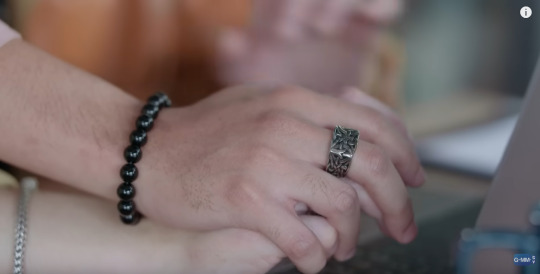
fighting certain urges about the hair on Singto's hands
But P'Lit and screenwriter Aof--who I've argued appears to have adapted these techniques from P'Lit's work on SOTUS--layer this shot with other visual information. In zooming to the hands, the ring, the mala bracelet, and the act of writing get secretly highlighted amongst the yaoi content. The show has not pushed us hard to think about their meaning yet, but there's been a subtle focus on jewelry and accessorizing already and the Buddhist themes have been an emerging question, too. It's just one of many examples in the series where the questions of materialism, emotional attachments, authorship, and queer embellishments arise without hammering the audience over the head with it.
And then on top of these visual strategies, Lit consistently draws out overwhelming performances from his actors that imbue what might otherwise be camp with a raw humanism, heightening the stories beyond run-of-the-mill romcom plots. With their flawed, conflicted characters and unflinching portrayals, they're tests of empathy.
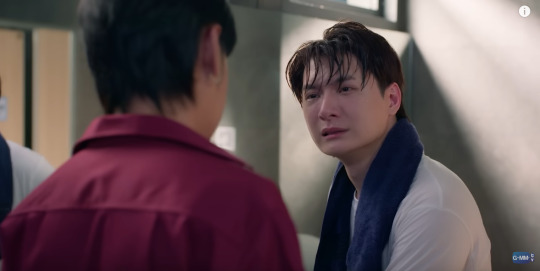
It's no surprise he's launched the careers of several renowned pairs--Kristsingto, DaouOffroad, YinWar (not their first outing, but the one that elevated them past their peers). In a P'Lit world you get to play a full range of emotions, and he's not interested in requiring violence or high-concept plots to experience those feels. It's pure romcom, with the full breadth of its possibility, which is something I adore.
Lit's not an auteur by the traditional definition. His vision's not singular, his work not so marked by his idiosyncrasies to be easily chosen out of a lineup of his peers. I think it's better for that. He intricately crafts his works so that you don't have your attention drawn to its craft or intricacy, letting the story and characters, which at first might seem silly, take hold of your soul.
81 notes
·
View notes
Text
After all these years, ‘I Remember You’ is still one of the great highlights of Adventure Time Storytelling. And not just in the basic ‘what???? Silly children’s cartoon does something SAD??? HOLY SHIT MIND BLOWN’ way. But with the execution of that Something Sad. How it manages to pack so many Complex Emotions into just 11-minutes of television. And especially the way it utilizes the basic Adventure Time format for that purpose.
So Adventure Time is a Board-based show. Each episode has an outline pitched and written down by the writer’s room, and then this outline goes to a team of (usually) two Storyboard Artists who develop that simple outline into a full story. And with the show’s art-style deliberately eschewing staying perfectly ‘on-model’ in favor of having the animators take direct reference from how the different storyboarders draw the characters
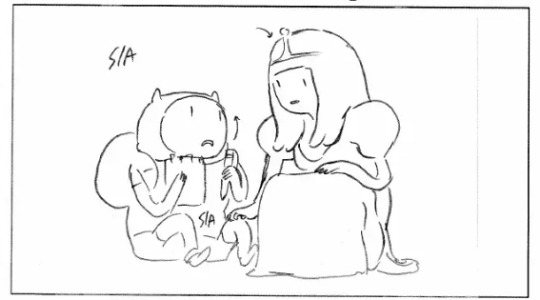

And the show being generally extremely versatile in terms of themes and tone - AT has allowed a lot of their Storyboarders to really express themselves and their unique artistic vision as part of the Big Collaborative Narrative that is Adventure Time.
Now, the Boarders who worked on ‘I Remember You’ are Cole Sanchez and Rebecca Sugar. These two were a Storyboarding Duo from the start of S4 and until Sugar left the AT Crew during S5, and they always struck me as a curious combination. I think really from all of the individual boarders working on AT during that time, these two really are the closest to having like… Totally Opposite Artistic Sensibilities as boarders.
With Sugar favoring a style that is very loose and sketchy and also very rounded. Focusing on expressions and subtle body language and lighting. And being famous for going deep in depth into Big Moments of Emotional Catharsis
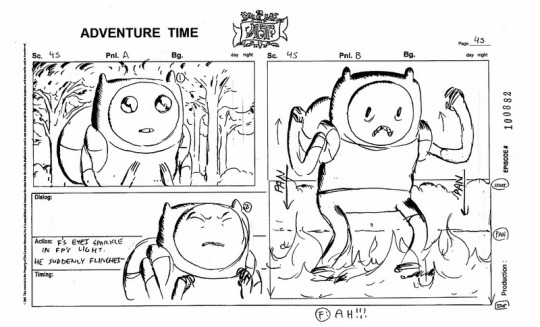
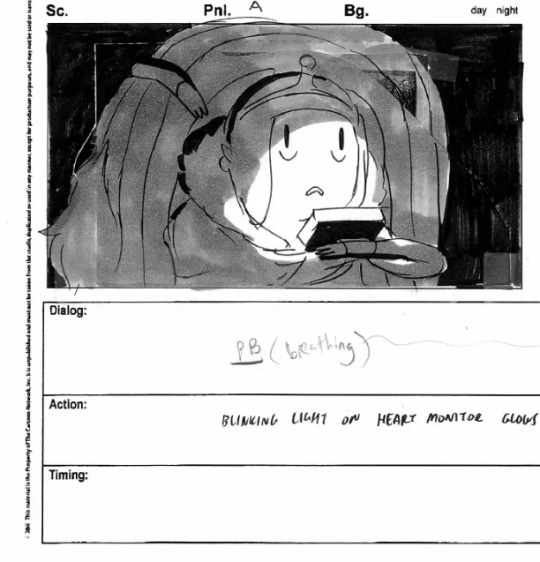

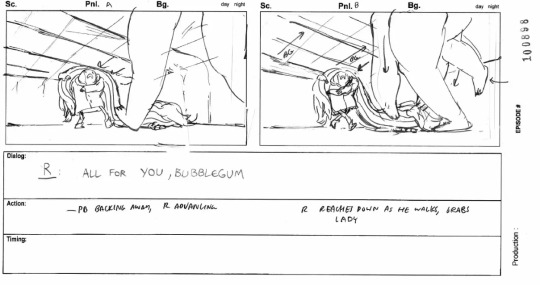
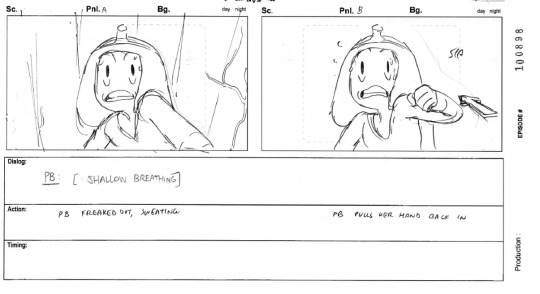
And Sanchez having a very clear art style that emphasizes strong silhouettes and clear lines that suggest flatness. Focusing more on major poses and the character’s positions in the space. And having just a really great eye for AT’s brand of silly humor.

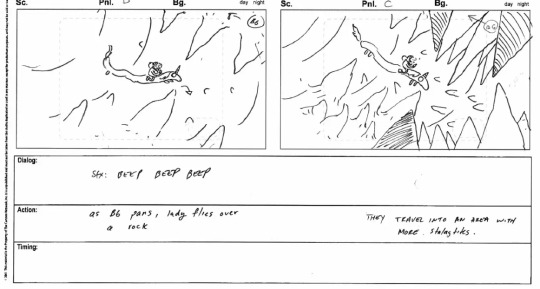

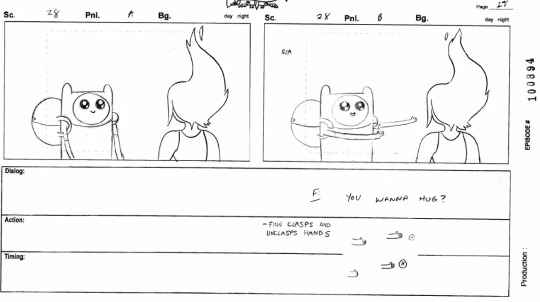

Like, I almost kinda suspect these two were paired together so they can each cover for the other’s “weakspots” in writing ‘Adventure Time’.
And there were a few episodes that did some really interesting stuff with this very contrasting pair - ‘Jake the Dog’ is another example. Giving most of the Farmworld scenes to Sugar and most of the Time Room scenes to Sanchez both plays to their personal strengths as storyboarders and helps to emphasize the strong emotional contrast between these two scenarios.
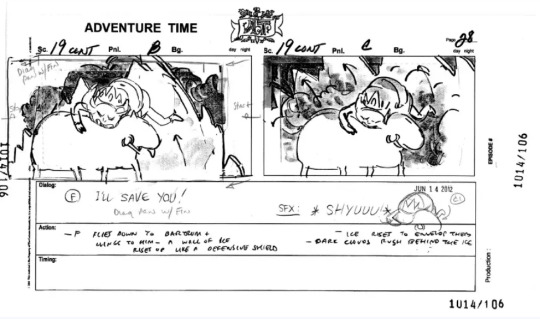
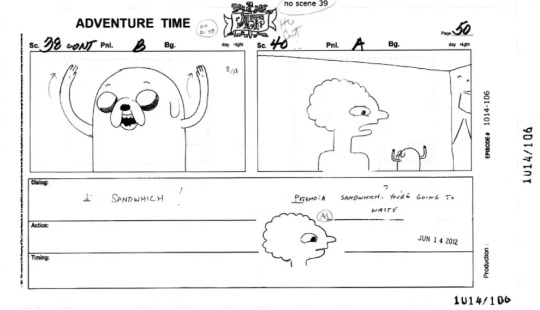
And ‘I Remember You’ is actually kinda unique among Adventure Time episodes cause… Most episodes will have the two boarders alternate between working on the episode throughout it. Like you’d have Boarder A draw a bit and then Boarder B and then Boarder A again… But “I Remember You” is divided between Sanchez and Sugar… basically perfectly in the middle.
So the entirety of the first half of the episode was boarded by Sanchez




Until Ice King pushes Marceline and then leaves the room in shame.
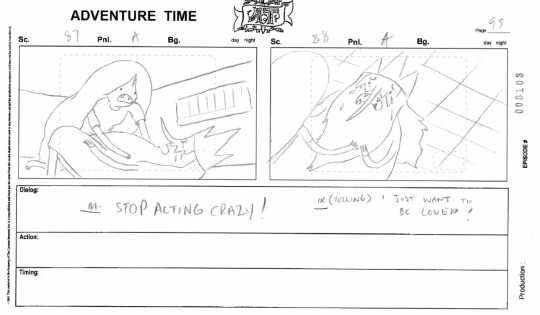

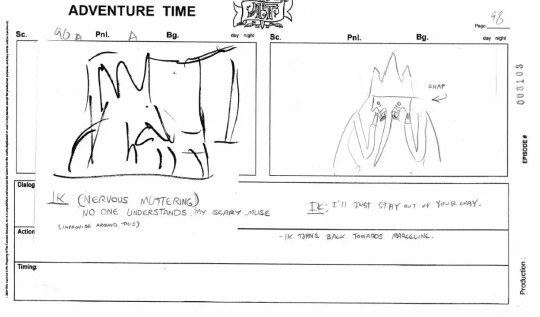
And then, Sugar takes over.

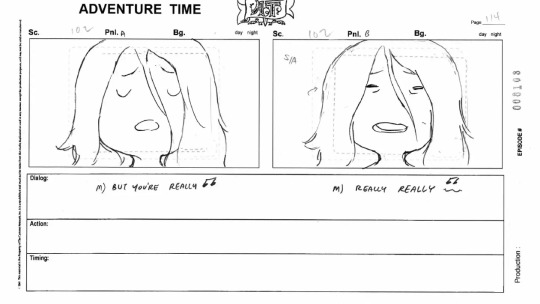
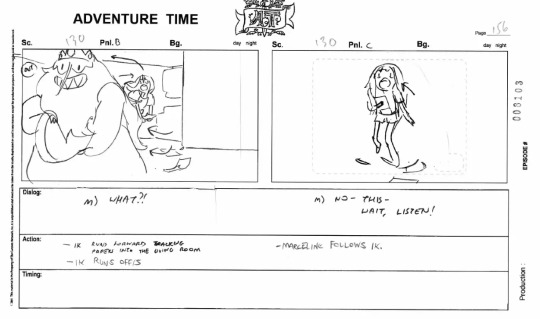
And, like, even if you don’t know anything about the Behind the Scenes of Adventure Time or who Cole Sanchez and Rebecca Sugar even are - the Shift is noticeable. The shift in tone, in narrative focus, in the subtleties in which the characters are drawn.

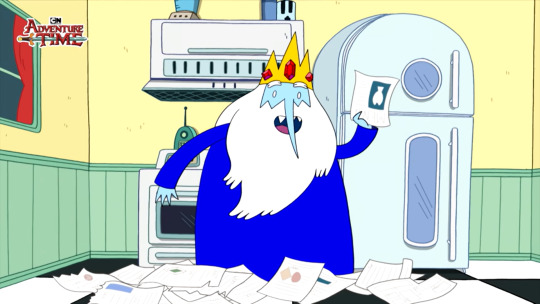
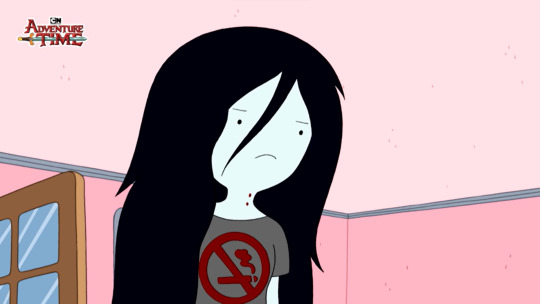
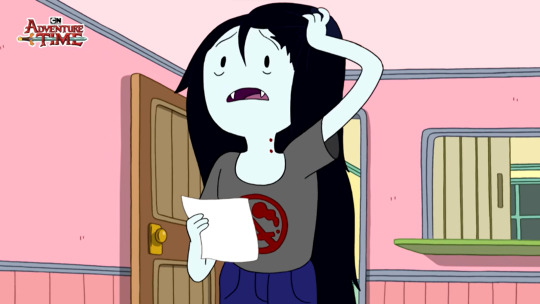
The entire first half of the episode has this thin veneer of just being a Silly Goofy Ice King Episode. Sanchez’s talent for Adventure Time’s brand of comedy is on full display… but there is also this underlying feeling that Something is Happening just under the surface. And these hints of the Big Emotions of ‘IRY’ expressed via Sanchez’s kinda goofy style really create this balance between putting the audience into a false sense of security that this is just a Very Normal Episode about two characters hanging out and the Tension constantly brewing in the subtext.
And then it all comes to a blow.
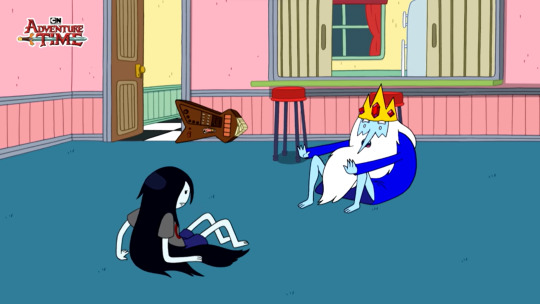
And then the Shift happens. And now we are in Sugar’s court.
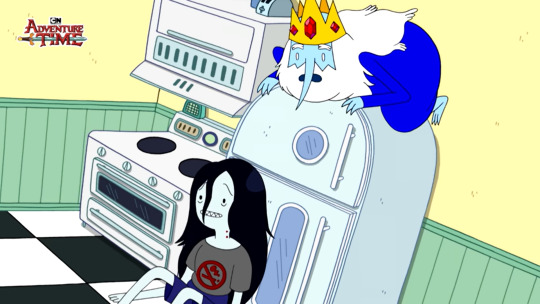
And this subtle shift in the artstyle and storytelling also coincide with Marceline finally openly expressing her feelings and the Reveal of Simon and Marcy's shared past. The episode changes focus from Ice King's silly antics to Marceline's feelings. Everything changes, everything in the first part of the episode gets recontextualized and... even on the most basic level, the episode is now Noticeably Different.
I would almost say that Sanchez’s half of the episode has Ice King define the tone, while Sugar’s half of the episode has Marceline define the tone. But more than anything it’s the catharsis. The reveal and release of those emotions that were building up so expertly through the Sanchez half of the episode. All of the Sugar-boarded scenes in this episode are really heartbreaking on their own, just through the tragedy of the story and Sugar’s expert knowledge of howto convey emotion in the visual medium - but it’s so enchanted by what came before it.
“I Remember You” is truly a great testament to how ‘Adventure Time’ could use every aspect of its medium to tell a great story in such a short time.
#adventure time#at#atimers#adventure time analysis#i remember you#rebecca sugar#Cole Sanchez#storyboard#ice king#simon petrikov#simon and marcy#the ice king#marceline#marceline the vampire queen#marceline abadeer#at ice king#at simon#adventure time ice king#adventure time simon#ice king adventure time#simon adventure time#simon at#marceline adventure time#at marceline#adventure time marceline#marceline at
697 notes
·
View notes
Text
Will's Queerness is the Emotional Heart of Stranger Things
I heard a bunch of people claim that Will's character was only made gay because of public pressure or because Noah came out. What show are these people watching? Let's look at the themes of each season and Will's place in them.
In Season One, Joyce tells Hopper that Lonney used to call Will a queer and a fag. His bullies called him a fairy. He spends the season "hiding" in the "upside down" and is "pulled out" due to the love of his friends and family. The rest of his friends are also a bunch of misfits from different marginalized groups who get bullied. One of the show's main themes is clearly tolerance for difference and finding safe spaces (castle byers as a metaphor) where you can be yourself with the people you love. Will's queerness here is mainly subtext but that is going to gradually change over the course of the show.
In season two, Will gets "violated" and "penetrated" by an "other worldly creature" outside of his control. It happens near the anniversary of the trauma caused by the previous season. It causes him to become isolated and depressed to the point where it nearly takes him over. Metaphorically speaking, many gay kids go through trauma and develop depression as a result. To break him out of his trance, Will's mother tells him a story about how his drawing of a rainbow ship (not so subtle Duffers) makes her proud, and his best friend, who Will shares numerous intimate moments with throughout the season, tells Will that asking him to be his friend is the best thing he has ever done. This is what snaps him out of the trance. Clearly, this is a metaphor for how many queer individuals suffer from trauma due to their past history of being abused, and how, once again, through the love of family and friends, they can escape the throughs of depression....Also, Will hesitates at the end of the season when a girl asks him to dance, so if you are looking for something that isn't subtext, there you go.
In season three, the theme is the terror and shame experienced when going through puberty, and for Will, he experiences it as a gay kid in the closet. All his friends get a girlfriend, and he doesn't due to his sexuality, which is clearly making him depressed. His friends are spending more time on girls and less time with himself. He retreats into DnD in the desperate hopes of keeping his friend group intact. More specifically, he doesn't want to lose the person he loves: Mike. This leads to a confrontation with his best friend who tells him "it's not my fault you don't like girls", which sends Will into a nervous breakdown as he destroys Castle Byers, aka, his "safe space". Once him and his friends sense the danger of this oncoming monster though--the monster here also being a metaphor for puberty--and what it can do their friendship, they band together to destroy it. Will and Mike make up with each other at the end of the season as Will tells him it was never about the DnD but it was really about spending time with Mike. Mike smiles back. The theme: don't let puberty, societal expectations, and relationships destroy relationships with the people you love...And if we are looking for something that isn't subtext related, Will spends the entire season in the gayest pair of shorts known to mankind and is disgusted by the idea of getting a girlfriend, which he refers to as "gross".
In season four, Will's experience as a queer kid continues its journey out of subtext and moves more closely to text. Will does a project on Alan Turing, a gay computer scientist that was forcibly castrated and committed suicide. Will makes a painting for Mike, his best friend for who he loves, by drawing him as a hero with a heart on his shield. He becomes devastated when Mike doesn't hug him at the airport or pay attention to him, and they get into a fight over it. They then have several heart-to-heart talks where they make up. It is clear in these conversations that Will is head over heels in love with Mike Wheeler. Towards the end of the season, Will gives his painting to Mike in veiled love confession where he clearly uses El, Mike's girlfriend and his sister who are dating, as a cover for his own feelings. Will is clearly heart broken. His brother tells him later in the season, without directly saying it, that he knows he is gay and will always be loved. Will's depression stems from his inability to live as his true self. As Eddie said earlier in the season "Conformity is what is killing the kids". Since Season Four is really only half a season despite its extensive length, we will have to see how these themes play out in season five, but I have to imagine it is going to end up, at the very least, with Will coming out, his friends and family accepting him with love, and maybe even reciprocity from his love interest.
Sixth months after Season 4 came out, Noah Schnapp came out. Oddly enough, Noah Schnapp did so, in part, because it was Stranger Things that inspired him to do so. It was not the other way around. He was inspired by Will's story.
How people can miss these plot points or the major themes of Stranger Things blows my mind. This is queer story about love and acceptance masquerading as a horror and science fiction story.
94 notes
·
View notes
Text
house md rewatch: 2x20, "euphoria part 1"
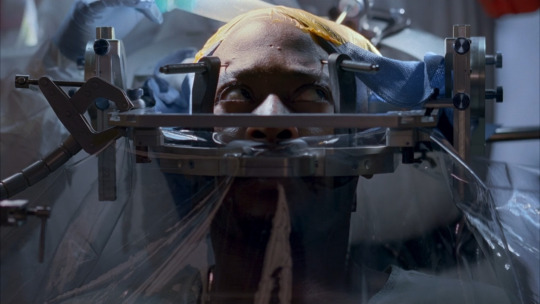
happiness as a life-threatening symptom is one of house md's smartest plot devices.
these episodes hit even harder than they did the first time i watched because now i have 8 seasons' worth of bonding with foreman, and seeing the events of "euphoria" play out has a lot more weight since they remain with him for so long. given that there are 2 parts at hand, i want to save a few details for when i finish the entire saga. i also won't be beholden to too much chronology here.
first, actually, a critique (more of a larger scale comment than something 2x20 specific). foreman's confrontation with cameron, after he nicks her with the needle, is a dialed-back way of explaining how he got here:
"if house would have pointed at you instead of me, you'd be the one in here. it's your job. you're a doctor."
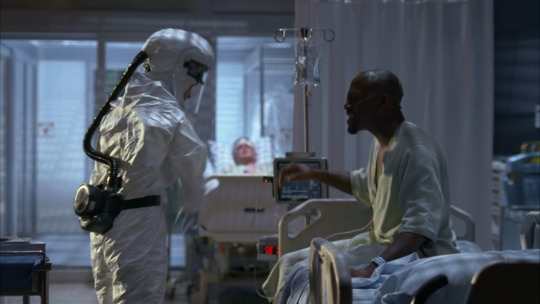
translation: had house treated foreman with the same dignity he does chase and cameron, foreman wouldn't necessarily be paying this price for doing his job.
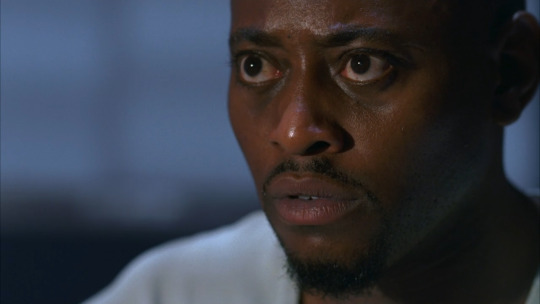
i'm actually a little unclear about the messaging here. i think it's obvious that house sends foreman to the patient's apartment, a crooked cop, as another meanspirited, racist joke. he plays up a stereotype and gets kicks out of it and foreman nearly dies as a consequence...but it house md making that last leap?
it's doubtful because if house md makes house's racism textually palpable and malicious, then it becomes a damning characteristic that can't be so easily forgiven via his misanthrope/addict identities. this is all to say that, if we're "supposed" to understand that racism fueled foreman's suffering in "euphoria," they didn't communicate that successfully - i personally doubt that was the goal in the first place.
if we watch 2x20 with the aforementioned subtext in mind, foreman's case is increasingly tragic. his lived experience and perspective is constantly devalued; any and all observations he made at the patient's apartment are disregarded just because house got fixated on an AC unit at the police precinct. guess which option was more medically relevant - the cop's marijuana greenhouse or the AC unit?
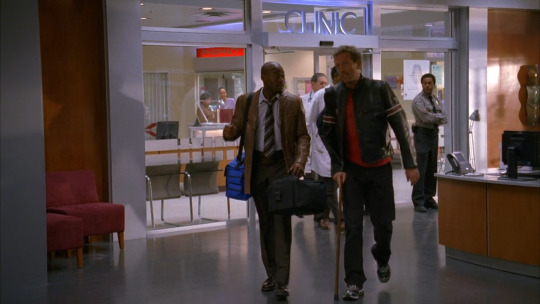
for me, the highlight of this episode (aside for omar epps' performance - top 5 in the show, easily) is the futile attempts foreman and house make to diagnose foreman because their sameness collides like 2 rocks. i think i characterized them as a rock and a hard place before; now they're acting like projectiles.

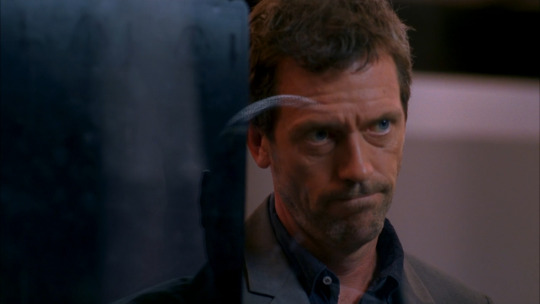
these 2 shots where they're both wielding diagnostic results is brilliant, even if foreman's opinion is less informed. the evidence for staph and for brain biopsy collide, and someone has to break the stalemate. that house hijacks foreman's consent and performs the biopsy anyway is just so fucking brilliant because it's doing 2 things:
highlight house's hypocrisy not just within the confines of 2x20, but in the show at large. who were you were more upset with - house violating foreman's consent and risking his life with dangerous brain surgery, or foreman for nicking cameron?
validates foreman's assault on cameron within the context of 2x20. house has elevated the stakes, and in an episode that so consistently exemplifies their similarities.
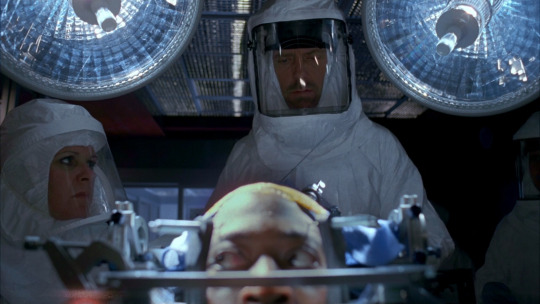
even the size of the needles in either assault speaks to the weight and intent behind both actions. house is having a mad scientist moment; foreman is trying to live.
i also love how "euphoria" finally draws real attention to foreman's specialty in neurology. his (perfectly understandable) fear of not just dying gruesomely like the cop, but having his mental & emotional faculties stripped from him along the way. foreman, in a much more dramatic context, mirrors house's own, generalized fear of losing his intellect. as the episode moves along, house sees more and more of himself in foreman, and i think this informs that experience.
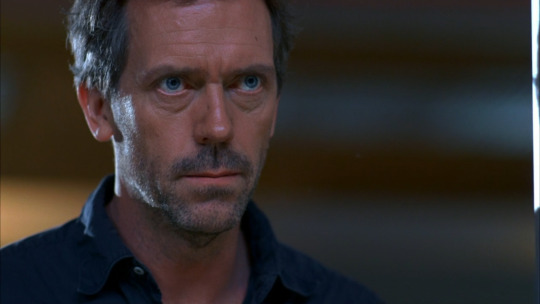
maybe this captured me so much because i have temporal lobe epilepsy (drop a like if you do, too! lol), but the specificity of house poking around in foreman's temporal lobe really got to me. the temporal lobe, among a lot of things, involves memory retention, along with auditory and linguistic retention.
foreman has remained the most mysterious of the fellows; we've hardly gotten a single lick of backstory apart from the infamous "carjacking" incident that is bandied around like a joke, more than anything. that foreman becomes exposed/undone under this kind of duress is just beyond tragic.
more subtly, though, is the increasing inability for foreman to communicate not just due to physical impairments, but emotionally, too.
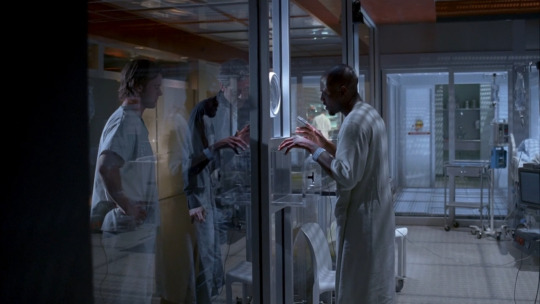
the communication barriers are visually represented by the glass foreman is confined within, as well as the cleanroom entryway that becomes such an obstacle in the episode's tensest moments. the communication gap is so drastic that house stops treating foreman like "any other patient" and goes to speak with him directly: "if i'm gonna be arguing with foreman, i may as well do it directly." (more on this).
in 2x20's climax, foreman cannot hear nor process the team calling the cop's time of death. it's as if all his own senses have shut down out of fear. nothing but fear has subsumed his brain - what a great to-be-continued shot that makes!
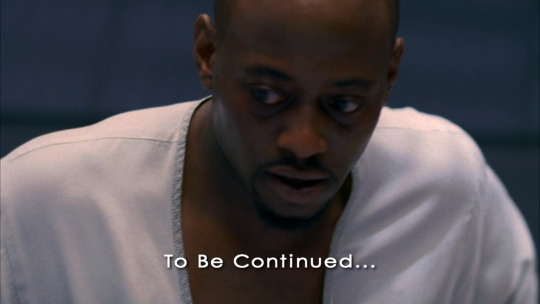
i want to make a quick note (even though it's Massively important to 2x20) about cameron's choice to go back to the apartment - it's one of the show's most successful ends/means/intent depictions yet. we can't truly condone foreman's choice to expose her (or, if you can, please explain because i would love to hear another perspective), but think we can sympathize both with the decision and cameron's subsequent reaction.
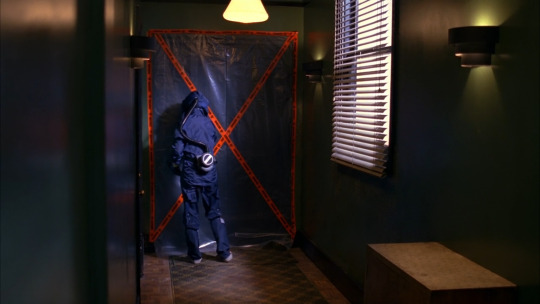
does saving foreman justify the threat? does cameron risking herself to save herself (and foreman) bad? the ends are enough to sweep this collective ethical qualm into one fingers-crossed, hoping for the best reaction from audiences, but house struggles so much with this.
"you wanted to be here. he just gave you the excuse. what does that guy have to do to make you hate him?"
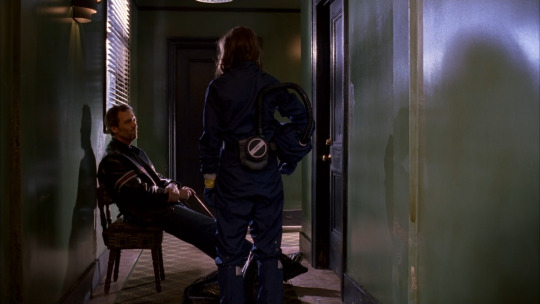
i personally think that cameron's non-answer is because she knows he can't explain this to house, this conflicting dichotomy between self interest and kindness. he always needs to pinpoint a singular answer, and thus far, "euphoria" hasn't offered one.
my second to last point does, actually, feature wilson; he has a typical "i, too, am in this episode" moment, but it's a very revelatory moment that's only possible with wilson around. house delays invasive treatment and opts to using the cop as a ticking clock to establish a timeline for foreman's symptoms. echoing foreman's earlier frustrations with house playing it safe, wilson observes that, "you're being cautious. you're being common." it's not just another case to house.
this is the strongest indictment against house's misanthropy to date because it's so frank and obvious. unfortunately for house, his brilliant retort is squashed by a moment of audience/wilson solidarity - despite house's cruelty in wishing he had wilson's job, wilson smiles like this:
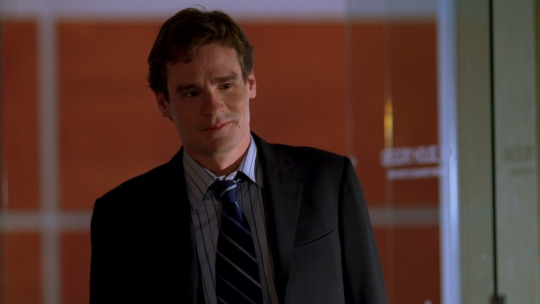
we know, along with wilson, for certain this time, that house loves.
(allow me an aside rq - 2x20 is SOOO pregaming 4x16. being cautious/unable to treat it like a usual case/avoiding risks/prolonging treatment at the contradictory expense of the patient you're trying to save/etc. wilson is quick to point out the cracks in house's armor, but we know damn well who will absolutely malfunction under similar circumstances in about 2 seasons).
finally, just to round-off, 2x20 really drives home one of house md's eternal questions: what can pain do to a person, and what can it make them do? the question resurfaces throughout the series in episodes like 1x11, 5x23, 6x01, 7x22, and so many others. that foreman experiences (in just part 1 so far) physical and emotional pain speaks to this. it makes people break, falter, freeze, lash out, and everything in between. house md makes a LOT of gambles when it comes to audience sympathy, and they knock it out of the park almost every time.
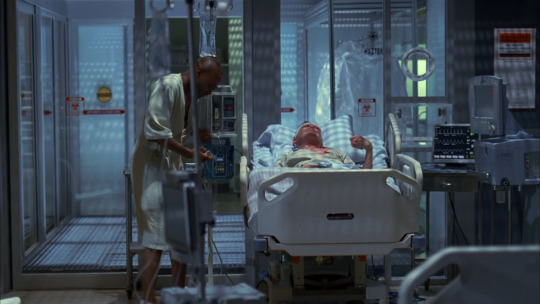
PS: i'll be revisiting the reference to lazarus in the episode intro in my part 2 recap!
#i was sincerely reluctant to watch this one#i haven't sought it out since my first watch because it's so emotionally brutal#omar epps is just something else#sorry if this one is a little brief#i feel like i could be more thorough but i want to make sure my part 2 recap is cohesive#house md#malpractice md#greg house#james wilson#eric foreman#allison cameron#robert chase#house md rewatch#rewatch 1#season 2
49 notes
·
View notes
Text
Subtext is completely lost in this fandom. I partly blame SJM for it. This is a rant from both reading and writing standpoint and leans towards the characters since I like to psychoanalyse them.
The one thing that tired me the most in these books is the excessive narration. I don’t mean the wordy description to support world-building but the never-ending monologues. SJM takes ‘show, don’t tell’ advice literally with the visual cues when it should apply to the characters and their personalities as well. Where subtext usually exposes depth of these characters and lets you decide who they are, SJM strips away that chance by writing it down for you word by word. The reason so many are going with 'in the book' argument is exactly this.
Here’s what I mean.
In real life, people don’t think linearly. They have an idea about themselves as much as they have about everyone else around them. There are self-imposed restrictions on their thoughts based on who they believe to be and who they strive to be. And it shows in their interaction with outside world. Say, when someone is ashamed of their actions, they will deny it for as long as possible. Someone who regrets something, they will sugarcoat it.
But in her books, her characters think clearly—way too clearly so that you latch onto the ideas she perpetuates. You don’t get to know them based on their thoughts, words, and actions, and see how these three support each other. You don't get a chance to draw conclusions as to if they are the hero/villain and good/evil based on their actions. If their behaviours match their words or if their choices are acceptable. Because SJM sets it in words for you. The characters come with a label beforehand. (Feyre, Rhysand and Inner Circle are good guys. Tamlin, Eris and Nesta, sometimes Lucien are evil.) It's why so many toxic and abusive themes are dismissed because it’s the 'good guy' or the 'morally grey guy’ who does it.
And so, her lead or ‘good’ characters fall flat since they have everything figured out. They know themselves inside out. They are never wrong about themselves, there’s no part they hide from themselves or the others. There’s nothing for you to read and identify the beauty or ugliness in the character. There’s no depth in them because they don’t contradict themselves, they don’t struggle to be someone they always believed to be. They don’t have to prove anything to themselves or others. They say what they think and they do what they say. They are very aware of their shortcomings and they all seem to know the exact consequences of their decisions.
Feyre doesn’t change in the three books. Her ‘rags to riches’ story doesn’t lead to much character growth. She starts out as an adamant, reckless child and ends up being arrogant, reckless woman with a crown. She doesn’t undergo a shift in personality but climbs up the social hierarchy. And that’s considered character development. Rhysand remains the same throughout. He starts out as a villain but later revealed as a good guy playing bad. Instead of growing into a hero—given his crimes, his ill deeds are negated with sympathetic backstory. And from there, it’s a flat line. There’s no growth.
In the end how does the character change in the aftermath of the events? Which of their beliefs are shattered and rebuilt? What is the emotional impact on the other characters? SJM does offer some closure on these regards but they are solely focused on a list of traumas and specific reactions set by SJM herself. And so readers refuse to think for themselves how these scenarios may play out and take the words relayed through the unreliable narrators who are essentially preaching SJM’s biases. Also, when they are so explicitly written down, there’s not much room for subtext. After going through pages and pages of justification, it tires you from using reason.
Even if we get past this (writing) flaw, there are other major issues. Story telling is a way of experiencing life. It helps build empathy, compassion and understanding of the world. Even in a fantasy book, when that world doesn’t exist, when the characters aren’t real, their journey are drawn from real life experiences. Relating to these characters is subjective and solely depends on the reader, but determining the rightness of their actions is not. This too is warped as SJM dictates which behaviour is acceptable and how far through her lead characters(Feyre vs Nesta imprisonment). Instead of allowing you to judge the choices, the verdict is spoon-fed through the ‘hero’. If the characters are forgiven, it’s not abuse. It’s a simple mistake. (It’s a mistake if it happens once and if there’s a changed behaviour after the apology.) If the characters are happy in the end, their acts are admissible. Unless SJM stamps the word ‘abuser’ and ‘bad guy’ in block letters herself(Tamlin), it's not even considered a possibility.
In short, in this fandom, ‘reading between the lines’ is acceptable as long as it supports what the author preaches. When it contradicts ‘it’s in the books’. Logic is valid only if you use it to justify the fan favourites and applaud them. Empathy is conditional. Compassion is conditional. Critical thinking is so discouraged that it’s pitiful.
#feyre critical#rhysand critical#inner circle critical#adding critical tags to keep the stans away#nesta#tamlin#eris#lucien#acotar critical#sjm critical#acotar writing criticism
158 notes
·
View notes
Text
“That period with Paris specifically was seen as a safe space for Black artists,” he says. “Louis talks about being welcomed there and not being a victim of America's particular brand of racism. Especially if you have a gift, if you're exceptional in some way, you have a space here, and that's not lost on Louis.” Anderson says the team had discussions about this ultra-specific slice of representation, and he even lobbied to take it further than what’s seen on screen and make the subtext even more overt. “I wanted Josephine Baker in the show,” he says. “There was a point early on when we were talking about what Season 2 would be like, Louis was going to make friends with [famed photographer] Gordon Parks and be kind of like his human companion. There wasn’t time, but there's some inspiration from him and James Baldwin’s experiences in Paris.”
#louis de pointe du lac#jacob anderson#interview with the vampire#amc interview with the vampire#iwtv#the vampire louis#the titular vampire#vampterview#love that they touched on the Baldwin aspects of Louis
276 notes
·
View notes
Note
Why do you think suo has crisis with contact when it's pretty clear how much attached he is with nirei. They share 724 panels together, he Cares about worries about nirei all the time heck even when Sakura was injured by endo , suo was more focused on calming crying nirei down more than caring for Sakura. His genuine smiles are always for nirei. His main focus in the battle is about protecting nirei. He connect with nirei so much
Thank you for this question, and I'm sorry it took me so long to reply-- You brought up a very interesting point, actually, between the text and the subtext. I'll draw the distinction between the two here.
In the text, i.e., the information on the pages, Suo is very close to Nirei (physically, friendship-wise, and narratively— they occupy the same role in the class, and paralleling roles in the narrative), as you have brought up the examples. I'd push back a little on Suo being "more focused on calming crying nirei down more than caring for Sakura", because to me, it's two sides of the same coin: his capacity to care for Sakura, at that point, involves calming other people (Nirei— Hiiragi got Tsubaki covered) down so that they don't crowd Sakura. I think Suo trust that Sakura is physically fine, as in he doesn't need medical attention. So the nuance is that it is not quite that Suo "doesn't care", but that he has likely assessed the situation and know that there isn't really anything he can do for Sakura except praising the latter when he wakes up. Additionally, in the text, Suo has an amicable friendships with many members of class 1-1, even Tsugeura, who seems to annoy Suo at every turn (lol). I love the connection between Suo and Nirei a lot, actually, as both friends and master-disciple (and the unique dynamics there and their own self-worth in this dynamics), and that's another area of subtext separate from the subtext that is relevant here.
Subtext-wise, I use the term "crisis of contact" quite symbolically — liberally, even — to mean all sort of contact, from physical to metaphysical (see the list of Suo's deflection). Which is to say that the "crisis of contact" primarily happens in the subtext: we have the text to support/imply it, but the meaning happens outside of the pages in a more symbolic space. It's like we are making wine (subtext) out of grapes (text).
Concretely speaking, Suo's closeness to Nirei does not erase this subtext; or, another way of thinking about it, is that outside of Nirei, Suo still have this crisis of contact— with his opponents; with his own deflections of Nirei's questions, despite their closeness; with his own emotions, even; and narratively, where this crisis acts as a narrative tool, emphasizing (via contradiction) the theme of togetherness through sharing meals, through genuine conversations, etc. etc.
EDIT: Looking through the above paragraph again, I now think also that it makes sense to think of the crisis of contact as an internal crisis within Suo: it’s not between him and anybody, large social group or individuals, but rather between his true feelings and his tendency to deflect from it. In this way, it makes more sense that he can be close to Nirei and yet the crisis of contact still exists — “between them”, even — because you can love somebody with all your might and still feel restrained from connecting fully. It’s the same problem Sakura had prior. It’s one of the most prevalent internal struggles in stories.
Sorry for the long-winded answer, but I hope this is (somewhat) clear!
#q&a.txt#wbk#wind breaker#suo hayato#nirei akihiko#suonirei#suonire#kinda#sorry for any obscure language i am a parody of a person (anne carson)#thank you anne carson#rccl: crisis of contact
42 notes
·
View notes
Text
I had an ask about why there is a difference in the scene where Halbrand returns Valandil’s sword vs the scene in the forge that I just analyzed and I think it’s an important answer. Firstly, shots of hands always signify something in cinema. Where they are placed, who they belong to, what is being exchanged and even the movements. I could write a whole thesis on Spielberg’s use of it in his films. And it’s no different in TROP. Hands convey intention, intimacy, ownership, emotion. Alot. Charlotte Brandstrom was even asked about the closeup shot of Adar's hand in an interview. The reporter asked her specifically about the scene where Adar is planting seeds in season 1 and this is what she said:
CB: I always start, I mean, first of all, visually, I always like to start with a character moment and not with a geographic moment. I don’t like to find out where I am, but I want to know what it is about. So by starting on a very tight insert of the seeds, I make it mysterious, and I think it’s more gripping because you want to find out more, and it says something right away about the character. And then I cut to wide, and it’s a tendency that I’ve developed more and more, always starting small and going wide, because I feel you sort of grab the audience’s attention and you also, I mean, as I said, you create small character moments, and those are the moments that most important I think in the story. (x)
So there you have it. The director is straight telling you that if you seek insight into these characters, it’s in these small, close details. And they purposefully edit it to keep it ambiguous. Not because they want to keep it vague. It's because there is the suggestion that there's probably more than meets the eye. There are multiple clues and multiple layers at play. These visual clues are supposed to be revisited and reinterpreted.
I bring this up because those close up details are a key difference in the scenes. So, let’s contrast the two: one in which Halbrand returns Valandil's sword to him. It may seem the two scenarios are very similar but there's more to it. As I said --it comes down to the details. In this case, their hands. Notably, you never see their hands in the same frame of this scene. Not in a close-up. Not when the sword is exchanged. There isn't anything sinister about it. It's just not emotional or personal. There is no subtextual communication here between the Valandil and Halbrand. Because this gesture isn’t meant for him. It’s meant for the elf standing behind him. And Galadriel in the background isn’t coincidental. You see the camera subtly shift from right to left to catch Galadriel witnessing Sauron offer the sword. Again, this act is meant for her.
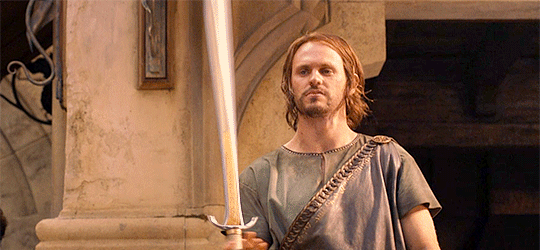
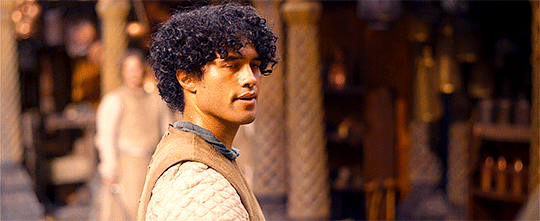
Later, with Galadriel in the forge, the context changes the whole subtext of the knife exchange. First, Sauron can’t help but draw her closer. So he feigns dropping the sheath of the knife so she rushes to his side. The proximity is intimate, charged. Then, there is the act itself of placing the knife in front of her. In the context of Galadriel pleading with him to join her cause, this gesture can be interpreted as symbolic of his acquiescence. A sign of his allegiance, his loyalty and ultimately a pledge of his life. But an added layer to this (after it is revealed that Halbrand had been Sauron), is the deeper, more earth-shattering meaning: he is offering to pay his penance. Sauron, repentant, apologizes in this scene. And this act is subconsciously meant as proof of his contrition. He was this close to facing judgement. Hers. He was this close to telling her and putting himself at her mercy, as if to say, “Here it is. The peace you seek. Seize this dagger and end it all. Take your revenge.”
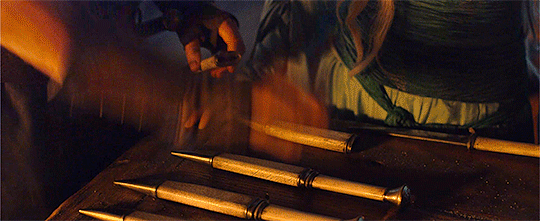
Between this knife, Valandil's sword and all the way back to when Sauron returns her brother's dagger, he has been telegraphing his loyalty and allegiance to Galadriel every step of the way. That was no ruse. It was not a ploy. Whether this was subconscious on his part or not, his intention had been consistent and genuine. He was offering himself.
Instead, she counters his offer with one of her own. Not knowing she was increasing the stakes. “Bind yourself to me.” No peace shall be found except at her side. And Sauron foolishly convinces himself into believing that this will balance their scales. It is his arrogance (somewhat delusional) the idea that he could be the architect of her pain, and the author of her deliverance. And yet that is very in keeping with his hubris.
#haladriel#saurondriel#charlie vickers#morfydd clark#sauron x galadriel#halbrand x galadriel#trop meta#haladriel meta#saurondriel meta#charlotte brandstrom#my edit
50 notes
·
View notes
Text
1: Magic is a Metaphor < 2: Morgana is a Lesbian < 3: Merlin is Gay < 4: Arthur is Bi
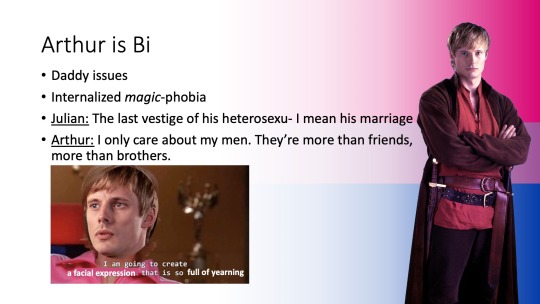
Do you remember when you were bullied in middle school? Because if you're reading this, I think it's fair to assume that you were. And your parents would say to you, 'that boy is just being mean to you because he likes you'. That's what this is.
Arthur is just so repressed. He has really bad daddy issues, and he doesn't know how to express his emotions, and he's really uncomfortable with physical intimacy, especially with other men, especially with Merlin. And this isn't me trying to psychoanalyse away his heterosexuality. It is a very evident part of his character.
And another big part of his character is that he has inherited all of these bigoted ideas about magic from his father that he has to work to overcome. Because, of course, Arthur himself is born of magic, but his dad is so ashamed of it that he hides the true circumstances of his birth from Arthur. Honestly, I don't know exactly how that would fit into this whole metaphor. I do have a half-formed theory that it could be interpreted as an allegory for intersex identity, I know that a lot of people headcanon Arthur as trans, so idk there could be something there. But regardless, it is only through his relationship with Merlin that he is able to overcome this magicphobia, because he realises: how could it be wrong when everything about Merlin is so right. And I just feel like there's a metaphor in there somewhere.
Of course, I have to mention this iconic quote from the audio commentary of the final episode: when the executive producer refers to Arthur taking off his royal seal to give back to Guinevere as passing over "the last vestige of his heterosexu- oh sorry, I mean his marriage." So, they knew exactly what they were doing.
I also thought I would just draw your attention to the fact that at one point Arthur says, "I only care about my men, they're more than friends, more than brothers." Now, I think we can all agree that out of context, that is a very gay thing to say, and yet somehow the context is even gayer, because Arthur is pretending to be talking about the Knights of the Round Table, but he's actually talking about Merlin, how Merlin is the only person he cares about, more than a friend. And then Merlin responds, "I understand. I wish I didn't, but I do." It's barely subtext at that point. This of course, brings me to my final argument:
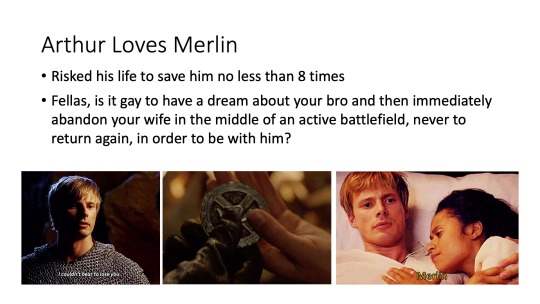
Arthur risked his life to save Merlin at least eight times. It could be more than that, I genuinely lost count. And you have to keep in mind that Arthur is the King of Camelot and he doesn't have any heirs. It is quite important that he stays alive. And yet anytime that Merlin is in the slightest bit of danger, he will just drop everything to protect him.
And it's really only in those moments where he's faced with the thought of losing Merlin that he shows him genuine emotion. Such as in this scene (which was cut out of 4x02 purely because it was too gay) where Arthur is planning to sacrifice himself to protect Merlin, again, and he gives Merlin his mother's sigil, the only thing he has left of his dead mum and he wants Merlin to have it as something to remember him by. Also, apparently in medieval times giving someone your family crest was basically a marriage proposal, so that's pretty gay.
You know what else is pretty gay? Telepathically communicating with Merlin and then immediately leaving Gwen in the middle of an active war. This is literally the last time that Arthur and Gwen ever see each other. Poor Gwen.
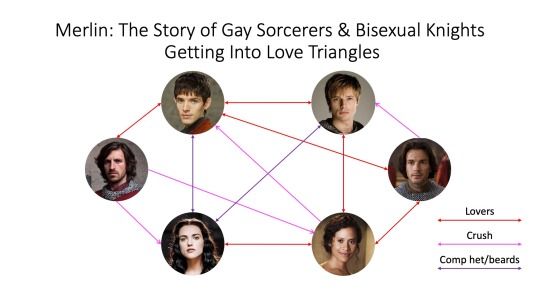
In conclusion, Merlin is the story of gay sorcerers and bisexual knights getting into love triangles. Everyone in this show is queer and you cannot tell me otherwise.
#because I realise this is the first post you'll see on the dash: this is all taken directly from a tiktok I made over a year ago#my thoughts on this point especially have developed a bit since then. and this is written for a more entry-level tiktok audience#so it's very lukewarm takes to my fellow soldiers in the trenches#but I'm not expecting this to get much notice and idc/idk how to articulate my thoughts better so just take it for what it is#arthur pendragon#merthur#bbc merlin#merlin#merlin meta#the magic of metaphor
162 notes
·
View notes
Note
can you talk more about the significance of the monty clift poster in blue velvet?
absolutely. when i rewatched the film a month or so back, it impacted me instantly. thinking about it now, it's still so affecting. such a meaningful choice.
the scene im talking about is directly after dorothy (isabella rossellini) shows up hurt and naked, and embraces jeffrey (kyle maclachlan). sandy (laura dern) is very hurt that jeffrey was secretly sleeping with dorothy (and that she found out this way). there's already a lot of subtext here, but the primary thing to know for my incoming point is that the whole film is about perversion, sexual trauma, and trauma response -- as related to the underbelly of american suburbia AND american mass media ("blue velvet" was a pop hit!). one basic reading of this scene is that jeffrey's perversion (perversion of sleeping with a vulnerable, dangerous, older woman -- and kissing sandy while doing it) is finally revealed to sandy. it's the answer to her "i dont know if you're a detective or a pervert" question earlier in the film. and it makes her painfully sob and slap jeffrey.
jeffrey leaves. 10 seconds later, we cut to sandy's room, which is the only time we see it iirc. and it opens with this image
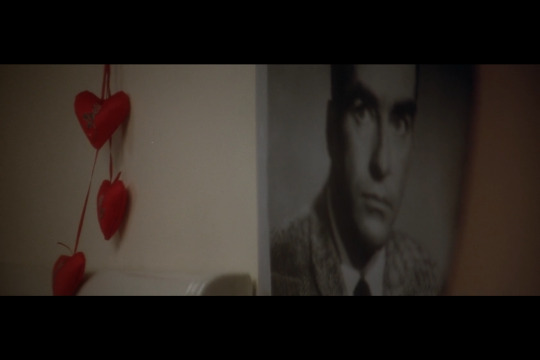
it's a poster of monty clift (40s-66 actor) late in his life. the camera moves back and reveals we're looking at a mirror. sandy is leaning on the poster as she calls jeffrey. crying, she says "you lied to me." jeffrey replies, "sandy, please, forgive me. i love you." sandy replies, "i forgive you, jeffrey. i love you. god, i love you. but i couldn't watch that. is she okay?" and the conversation continues from there.
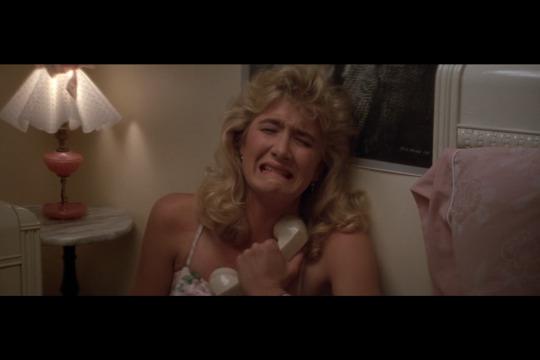
so, it is very striking that this sudden scene of forgiveness and unconditional love despite (or in understanding of?) perversity begins with a shot of a poster of monty clift.
clift had a hard life. i dont know if or how often he was happy, but just on paper it was difficult: he was too famous, prying press, drinking/drug problem, privately gay/bi, terrible health problems, facially disfiguring accident, labeled difficult to work with (which made him unemployed for the last 4 years of his life, before he died at 45 of a heart attack). maybe mentally ill too. also, he was constantly gossiped about for his relationships with older women. this came from both the public and his industry. so, for reasons including and beyond his sexuality, monty clift was othered. made perverse. the underbelly of americana
he was a total star when he started movies. a heartthrob, a box office AND critical draw, a new kind of actor. he directly inspired many, including ofc jimmy dean. he remained big for a bit (even after his accident in 56) but died before he could salvage his image.
so. again. david lynch choosing to begin this scene about learning about the perversities of someone you love, and choosing to love them anyway, on monty clift... is really impacting. im invested in the "blue velvet" story, so im already emotional, but im also invested in my complicated relationships with stars (including monty). it's emotional to see someone real so derided for who he is being loved this way (and all the symbolic acceptance of queerness, substance dependence, all sorts of perversion). sandy not only loves monty, she LEANS on him for support when she's in pain. she's talking to monty as much as she's talking to jeffrey -- and she doesnt even know it.
this is the first and only time we see this poster -- first and only time we see ANY poster of ANY star (iirc). her wall isnt even collaged. the film frame is filled with monty at first. it's such a striking, purposeful image.
it's david lynch's great empathy for this real person and great love for films & film culture. it's a quiet, loving tribute. it's the whole point of the film
also, id like to point out that "blue velvet" features a number of old hollywood actors, most prominently dennis hopper, dean stockwell, & hope lange, who all acted during the film's setting (55-65). it's a tribute to them as well. an empathy, an understanding, an acceptance. it's emotional on that front as well
27 notes
·
View notes
Note
What is your opinion on clannigram (Clarice/Hannibal/Will) as an option?
Honestly, *Clannigram* in the *NBC Hannibal* world would be such a wild, layered dynamic. It’s like a battle of minds, morality, and obsession.
1. Hannibal and Will’s Relationship – This is the heart of the show. Hannibal and Will are obsessed with each other, emotionally and intellectually. Hannibal *adores* Will—his mind, his darkness, and his potential to embrace that darkness. There’s so much subtext, tension, and love (in Hannibal’s own twisted way). So introducing Clarice into the mix adds a whole new level of intrigue because…
2. Clarice’s Role – In the *NBC* universe, Clarice is a strong contrast to both Hannibal and Will. She’s someone Hannibal would still be fascinated by, but in a different way than he is with Will. She represents purity, justice, and a steadfast moral compass—qualities Hannibal both respects and wants to corrupt. However, unlike Will, she wouldn’t be as easily manipulated. She’s not as vulnerable to Hannibal’s psychological games, and that would *frustrate* him, while also feeding his obsession.
3. Jealousy and Power Dynamics – You KNOW there would be some serious jealousy between Will and Clarice. Will’s relationship with Hannibal is so personal, so tied to their shared understanding of darkness, and Clarice’s presence would disrupt that balance. Hannibal, being the manipulative mastermind he is, would probably *love* playing them against each other, seeing how far he can push them both. But here’s the kicker—Clarice wouldn’t let Hannibal control her the way he does Will. She’d push back, and that resistance could either draw Will and Clarice closer as they both try to escape Hannibal’s web—or push them further apart as Will’s jealousy spirals out of control.
4. Hannibal’s Emotional Depth – In *NBC Hannibal*, Hannibal’s feelings for Will are so intense and complex. With Clarice, you’d see Hannibal wrestling with a different kind of admiration—one that isn’t just about manipulation or turning someone into a killer. He’d be fascinated by her moral integrity, but his obsession with Will wouldn’t disappear. The emotional dynamics between these three would be insane because Hannibal’s love for Will is so deep that even his interest in Clarice would somehow tie back to *Will*. Everything comes back to Will.
5. Clarice and Will’s Relationship – This is where things get really juicy. Clarice could be a stabilizing force for Will, someone who pulls him back from the brink of becoming Hannibal’s mirror. But there’s also the potential for tension because Will might feel like Clarice doesn’t *understand* him the way Hannibal does, which could lead to an even deeper bond with Hannibal. Or maybe Clarice would challenge Will’s feelings for Hannibal, forcing him to confront the fact that he’s been emotionally manipulated all along.
#hannibal#hannigram#will graham#clarice starling#hannibal lecter#clannibal#clannigram#hannibal meta#hannibal fandom#murder throuple ?#asks
53 notes
·
View notes
Text

LET’S TALK ABOUT EXPLORING LOKI & MOBIUS THROUGH THE LENS OF QUEER EXPERIENCE
Thank you for this request, @nabananab
Before I dig into this juicy ask, I think it’s important to note (however obvious the fact maybe) that an individual’s unique engagement with art is an inherent and integral part of art. The intention of the artist and the sociopolitical influence of culture, while important in our interpretation of a work, are not the sole source of drawing the work’s meaning. We are all artists in one form or another. I consider myself one of the pen, and nothing is more important to me than art giving someone a sense of emotional connection. I should hope other artists would agree, and for this reason I am an ardent believer in art taking on a life of its own once it has been created. The creator’s word, while it matters to some degree, does not supersede an individual’s relationship with the creation. Our histories, our desires, our fears, our likes, our dislikes, indeed our infiniteness as fragile human beings, allow us to create an elevated, spiritual interpretation beyond the confines of original intent. With art, there is no such thing as “reaching” or “reading too deeply”.
I leave this message with all of you as we look at these beloved characters through the lens of queer experience.
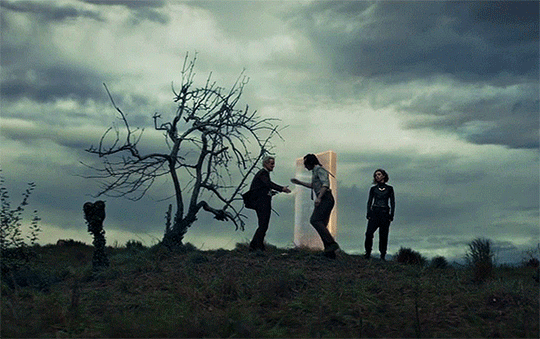
LOKI
Culture influences what we see and hear, which in turn influences artistic portrayal. Setting aside Norse myth, Marvel’s Loki is a classic example of a queer-coded villain (later canonized as a queer antihero). Deception, daggers, sexual temptation, transformation, and magic are all culturally tied to the “immoral” facets of femininity. Just as a strong, independent woman untethered to the control of man is deemed a “wicked woman”, a man demonstrating gender ambiguity and like qualities is similarly judged. Only masculinity is viewed as pure and good, and this no doubt was—and continues to be—a key force in white, western colonization’s destructiveness. It all but crushed our rich global history of divine femininity, gender diversity, and romantic and sexual expression.
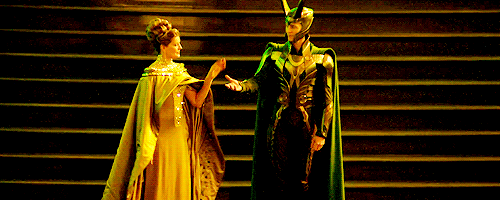
Asgard, as Marvel portrays it, is without a doubt a masculine-dominant warrior society. Only two women feature prominently: Queen Frigga and Lady Sif. Whereas Sif embraces her masculine qualities and fits in easily with Thor and the Warriors Three, Queen Frigga embraces her feminine powers, though her authority is submissive to the All-Father, Odin. Her influence is most heavily seen in her adopted son, Loki, with whom she shared and taught magic in hopes that Loki might “feel some sun on himself” despite the “long shadows [Thor] and [Odin]” cast. The magic that Frigga gifts Loki, however, attracts scorn. The subtext here is that Loki’s specialness, his individuality, comes from feminine powers despite presenting as a man, and a gender ambiguous one at that. Unlike Thor and Odin, he is not masculine. While strong, he does not exhibit Thor’s brute strength. He is cautious, thoughtful, another feminine quality, whereas Thor’s courageousness often veers toward foolhardy and brash.
Thus, if Loki cannot be loved and accepted as he is (a queer person of another race), he will force love and acceptance through the power of the throne. Kings oft inspire fear, coercing subjects to love them whether they wish to or not. But we know Loki never truly wanted the throne. The throne is a mere distraction from, perhaps even a poor replacement for, what he truly wants: genuine love and acceptance that cannot be bought. Unfortunately, Loki believes he will never get these things, which is why, when Mobius questions him, Loki’s desire for control (Loki, King of the Midgard; Loki, King of the Nine Realms; Loki, King of Space) can never be satiated. Mobius challenges Loki for the exact purpose of revealing this to him. What do you really want? At this point, Loki does not have the words to form an answer. In S2E5, Syvlie raises the question Mobius originally asked in S1E1. It is then, after experiencing Mobius’s friendship and the other relationships that come to being as a result (including Sylvie’s), that Loki can articulate his answer.
Loki’s othering, even before the discovery of his true identity as a Jotun (an allegory for a villainized foreign race), creates a lonely environment in which Loki’s potential for goodness is quashed by centuries of resentment, bitterness, and jealousy. His attempts at masculinity take the form of violence, all of which are, as Loki admits in S1E1, “part of the illusion; the cruel elaborate trick conjured by the weak to inspire fear.”
Loneliness and the desire for love and acceptance are a universal human experience, but they are felt far more acutely within our intersectional queer communities.
MOBIUS
His fascination with Loki is compelling because there are many things we can infer about its reasons. The first, most obvious explanation is Mobius’s “soft spot for broken things”, which is in some ways tied to his qualities as a compassionate, forgiving, and supportive father. A secondary explanation is a wish for partnership. We know from S1 that Mobius’s friendship with Ravonna spanned eons. We later learn in S2E6 that he and Ravonna started out as peers, hunters. They were partners on the field, but where Mobius “failed” because of his humanity, Ravonna “advanced” because of her ruthlessness. This change in relational dynamics left him partner-less. Finally, a third, less obvious reason is Mobius’s desire to express himself in ways Loki does so effortlessly. That desire may come from the suppression and repression of his own softspoken queerness in order to survive the fascist culture of the TVA.
Mobius is captivating for many reasons. Whereas Loki is a textbook example of culture viewing “queerness as evil”, “queerness as flamboyance”, “queerness as stylishness”, “queerness as loudness”, “queerness as sexual promiscuity and deviance”, “queerness as chaos”, Mobius very much aligns with the image of a straight-passing, repressed queer individual. This is an identity that does not get as much attention or presence in artistic media as it deserves, for there are many who need this representation to reflect them. He is not stereotypically queer by any means: he is not colorful. He is not stylish, flamboyant, or loud. His sex appeal primarily derives from the viewers’ attraction to his personality, though it certainly helps that Owen Wilson is quite handsome.
Combine these three reasons, and it becomes easy to see how a character (or person!) like Mobius might fall in love with a character (or person!) like Loki.
There is a certain amount of beautiful irony in how Loki and Mobius affect one another and consequently their identities. Mobius, feeling compassion toward an individual who has been brutally othered and oppressed, seeks to free Loki from the confines of his narrative, as determined by the “Time Keepers”. The only feasible way to do this is to bring a variant of Loki out of the timeline and into the TVA. Mobius then provides Loki with the opportunity to change by: acknowledging Loki’s strengths, giving Loki the chance to use his strengths in productive ways, praising Loki when he does well, listening to Loki, believing in Loki, calling out Loki, and accepting Loki as he is, with all his history, without judgement. Mobius does not try to force change like Thor or Odin. Rather, he creates an environment in which change could happen naturally. This kindness and, indeed, what becomes unconditional love by the end of S1E4, allows Loki to embrace his authentic queerness with self-love and use his feminine powers for altruism rather than masking them with self-hatred and masculine rage.
FREEING LOKI
In S1E1, Mobius is enthralled with Loki’s hijinks as the handsome, charming, devil-may-care, D.B. Cooper. This minor escapade in Loki’s life, which was likely only intended for laughs by the writer, reveals something interesting about Mobius: Loki’s mischievousness, his magic, his cunning, are all quite endearing to him when no real harm is being inflicted. That is, Loki, when not under duress, is someone to be admired when he’s being himself. We admire in people what we wish we had in ourselves, and this, at times, may lead to powerful attraction.
Loki, for his part, does much the same for Mobius. The environment (the TVA) which allowed Loki to thrive is also the same environment that has abused and constrained Mobius.
The heat that Ravonna presses upon Mobius, however, changes his tone with Loki himself. When Loki asks Mobius why he “[sticks] his neck out for [him]”, Mobius provides Loki with two options to choose from: “A. He sees a scared little boy shivering in the cold, or B. He will say whatever he needs to say to get the job done”. Option A, while insulting, has compassion layered beneath the barb. Loki, an expert at cloaking truth with meanness, sees through this and indirectly chooses what he believes to be true in the cafeteria scene: that Mobius feels sympathy for Loki’s painful childhood. The subtext of this acknowledgement is that the true means to the end is reversed: Mobius doesn’t need Loki to catch the Variant on the timelines. Mobius needs the Variant to free Loki from the timelines. The Variant is an excuse and another agent of poetic irony: when Sylvie unleashes the multiverse, she literally frees Loki of his predetermined narrative.
The conceit of S1E1 is that Mobius intends to use Loki for the “good” of the Sacred Timeline. It is important to remember that characters, while not real, are meant to mirror human complexity. Multiple, seemingly conflicting things may be true concurrently. In S1E2, we see in Mobius’s conversations with Ravonna that he deeply believes in Loki’a capacity to be a wonderful person and wants him to have the opportunity to change. His enthusiasm for these things outshines his desire to catch Sylvie.

And, because the Variant is Loki, because Sylvie is Loki, because, as she says, “[they] are the same”, Mobius’s own freeing of Loki, his unconditional love for him, cascades from Loki to Sylvie. Sylvie would not be free to live as she pleases if not for Mobius’s compassion for Loki in the first place.
In S1E4, Loki reveals the TVA’s sham. Mobius’s sense of self becomes fragile alongside his sense of partnership with Loki. But because of our sociopolitical culture’s influence on capitalism, the creative voices of the Loki series self-censures what could be (what is) a queer romance. This self-censureship makes itself known in Mobius’s own self-censureship. His jealousy and heartbreak cannot be spoken directly. It must be spoken through the words of a woman, someone who presents as the opposite sex. Through a looping memory of a scornful Sif telling Loki, “You are alone and always will be”, Mobius makes known the nature of his feelings for him.
BUT WHO WILL FREE MOBIUS?
In the same cafeteria scene in S1E2, Loki asks Mobius if he’s ever ridden a jet ski. Mobius’s response is demure, saying him riding one would “cause a branch for sure”. The jet ski gives the audience another clue as to what Mobius seeks in life: something fun, thrilling, and reckless. Yet Mobius sets aside his desires for what he believes is for the good of the TVA, and thus humanity. This suppression and repression of authentic selfhood mirrors the queer experience of living within a heteronormative culture, especially one with religious doctrines that equate pleasure with sinfulness.
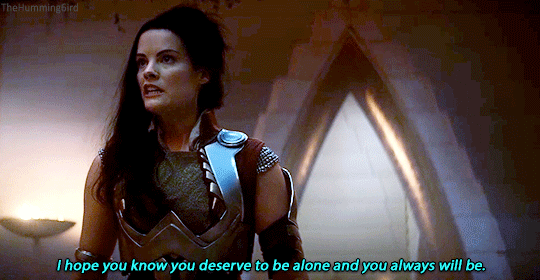
Because Mobius extended his heart, his partnership, his love (symbolized by twin daggers hidden in his locker [a closet]; notably a male phallic symbol of which there are a pair [partners]) and was soundly rejected, Mobius retaliates with the loneliness he himself feels. This loneliness may be interpreted as an allegory for the loneliness of being closeted as opposed to the loneliness of being out but othered.
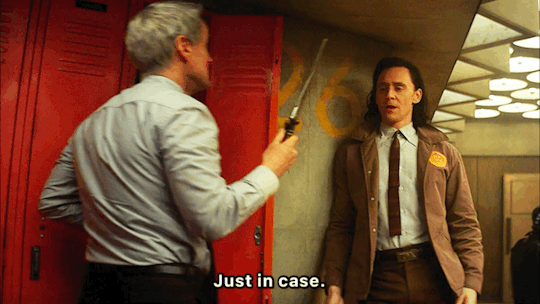
Ultimately, Mobius’s love for Loki shifts from selfish desire to unconditional love when he chooses to help Loki save Sylvie. In S1E5, it is conspicuous that after delivering Sylvie safely to Loki’s side, Mobius’s partings words are, “Guess you got away again”, to which Loki replies, “I always do”, which echos the lover’s trope of “the one that got away”.
[It drives me absolutely bananas that I can't find the specific gif I need when I literally saw it multiple times earlier this week but didn't need it THEN]
Owen’s acting choice is interesting here. He laughs, smiles, then looks down before looking up again, his eyes shifting from fondness to what feels like longing. Mobius extends his hand, a sensible choice for someone who believes his love is unrequited and is unsure of how Loki defines their relationship. Loki, appreciating what Mobius has done for him, closes the distance with an embrace and thanks Mobius for his friendship.
In S2E1, upon Loki’s time-slipping into the war room, whatever apprehensions Mobius had about physical contact was wiped away by the collapse of the TVA and the memory of Loki’s hug. In this scene, it becomes clear to Mobius that Loki is panicking. He makes the executive decision to use his physical contact as a grounding force, relocates Loki to a quiet environment, asks after Sylvie with no bitterness in his voice, then prioritizes Loki’s physical well-being. Perhaps, in Mobius’s view, his love is unrequited, but there is nothing in place to stop him from expressing that love more freely while honoring Loki’s feelings for Sylvie. This regard, which may be construed as platonic, may also be viewed romantic, courtly love.
The fight between Loki and Sylvie in S1E6 sets the stage for Mobius to receive Loki and become a refuge for heartbreak.
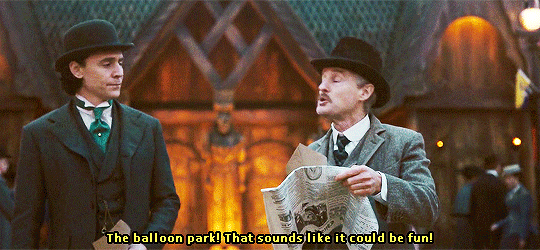
S2E2 and S2E3 has Loki’s and Mobius’s temperaments when it comes to investigating flipped. In S1, Mobius was focused on the mission and often had to reign in Loki. In S2, Mobius is more casual, more willing to take his time and enjoy the sleuthing as it unfolds, while Loki administers pressure to stay focused. The question is why?
In S2E2, Brad attacks Mobius’s sense of self. He points out how weird it is that Mobius is not at all curious about looking at his timeline and stresses that the TVA, and everything in it, isn’t real. Brad calls into question Mobius’s reason for staying. Knowing that the answer is Loki, we can surmise through the queer lens that Brad also corners Mobius into potentially outing himself in front of the object of his affections, someone he believes does not return his feelings, and whose knowledge of those feelings may threaten their friendship. This is a traumatic experience for queer people in the real world, and this extra layer of emotional conflict adds depth to Mobius’s violent response.
Mobius influenced Loki in a myriad of ways. One that has not been discussed yet is an appreciation for focus and order. Loki, in turn, has cracked the door open for Mobius to explore pleasure. We can speculate that, in his own way, Mobius is testing what happiness could look like living a life between the TVA and the timelines. For him, this means cocktails at the theater, cracker jacks, and exploring the World’s Fair, all of which are pleasurable on their own but are even more so with Loki’s company. His queerness, once again, is quiet, mundane, but playful in its own right, and finally brave enough to explore. These scenes suggest that Mobius is indeed happy at the TVA and, as we see in the finale, this happiness is solely rooted in his relationship with Loki and the emotional intimacy they share together.

Loki expresses concern for Mobius, noting that he has “never seen him like that before.” Mobius, interestingly, deflects every concern by absurdly blaming Loki: “He got under your skin”, “I was following you!” The psychological undercurrent here is that Loki is the reason why Brad got under Mobius skin. Loki is the person that Mobius will follow.
Loki takes Mobius’s distress in stride, responding in a way the Mobius normally would. However, Brad’s question piques his interest, and his own care for Mobius prompts him to gently challenge Mobius’s lack of interest in his own timeline. Mobius’s reason for avoidance is, “What if it’s something good?”
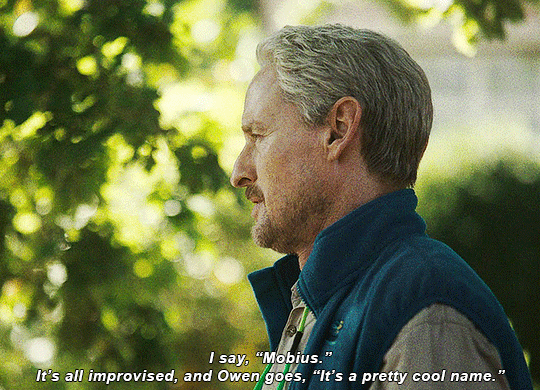
In S2E5, it’s interesting that “good” in this narrative is defined as a heteronormative fantasy of a house, two kids, and (possibly) a puppy and a snake. The “good” in Mobius’s original timeline, however, is imperfect. There is a partner that is missing (partners being a recurring theme in the series, particularly in S2E3), pronounced gone not once but twice. The entire scene between Don and Loki has been discussed at length by many, so there’s no need to reiterate it here. However, let’s bring our attention to Mobius’s avoidance of this “good” because this avoidance resonates with another queer experience.
The TVA, for Mobius, is the place where he studied, saved, and developed a close relationship with Loki. The fear of the “something good” is the fear of being confronted with something Mobius “should” want more than the TVA, and therefore “should” want more Loki. The fear is wanting something (or feeling pressured to want something) other than a queer relationship with no children. The question of “choice” is impacted by what is considered the “norm”.
S2E5 very pointedly focuses on the concern of choice, especially Mobius’s choice, in the bar scene between Loki and Sylvie. “Mobius should get a choice now, no?” At this point, Loki’s regard for Mobius has finally caught up with the romantic nature of Mobius’s feelings for him. And Loki, living his own queer experience, is also afraid of his true desires like Mobius. In being part of the intersectional queer community, the psychological need to guard against disappointment is high and commonplace. Desires are easily disappointed by the expectations of oppressive social mores. This survival tactic manifests itself with our hope and heartbreak with mainstream media, Loki the series being among them.
But Sylvie, the harbinger of true and absolute freedom, takes on the role of supportive ex and challenges Loki to answer Mobius’s question in S1E1: “What do you want?”
In this, Mobius and Loki’s individual relationships with the TVA are identical. It was never about where (the TVA), when (time works differently at the TVA), or why (the timelines). It was about who. It was about each other. The TVA represents a liminal space which became home by virtue of the people who brought love into it. The TVA is code for Loki and Mobius when each speaks of it.
Again, the artists behind the media must self-censure. In this, Loki also self-censures while giving the truth. “I don’t want to be alone. I want my friends back.” It cannot be denied that Mobius is Loki’s first truest and closest friend. “I don’t want to be alone. I want Mobius back.” Sylvie appreciates and validates this desire, but also points out that showing the TVA is something that cannot be unseen. The implication of this response suggests that Sylvie believes that Loki’s friends will feel compelled to join the TVA out of moral pressure. She reiterates the true lives that are being lived, and Loki, loving his friends, loving Mobius, elects to not take that away from them. “You are just fine without the TVA.”
Yet, Loki must choose an act of profound selfless love to save everyone. In doing so, he saves and frees Mobius in the way Mobius saved and freed him. The tragedy and, once again, poetic irony is that they both would have chosen each other. In giving everyone freedom, the true freedom of Loki and Mobius is sacrificed. This double-standard reflects in our reality between those who identify as cis and heterosexual and those who do not.
When Mobius looks at his timeline in S2E6, he does so for one reason: that timeline survived because of Loki’s sacrifice. He must honor that sacrifice and see what Loki protected. Mobius appreciates what he finds, but he doesn’t belong there. It is not what he ultimately longs for. And there must be worry, shame, in recognizing he would prefer to give up the house and two children if a life with Loki were a viable choice.
We all experience loss in our lives. Loss without a goodbye is also commonplace but is another pain that is more acute within the intersectional queer community. I speak of missed opportunities for happiness due to external forces. I speak of loss of self. I speak of loss of friends and family and home. I speak of death, losing a loved one without a goodbye, because same-sex lovers are not considered next of kin, an impossibility without marriage. Marriage echoes back to Don, who has no spouse, and Mobius, who has no partner.
#asks#loki#mobius#lokius#loki season 2#loki series#loki meta#my meta#loki analysis#my analysis#queer community#queer#queer representation#queer relationships#lgbt representation#lgbtq community#lgbtqia
249 notes
·
View notes
Text
The subtext in Jayvik
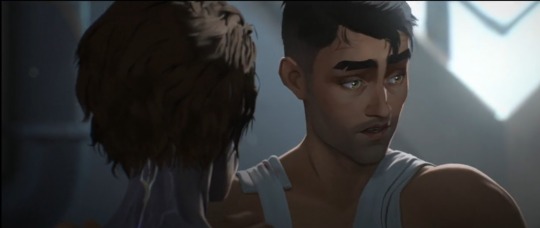
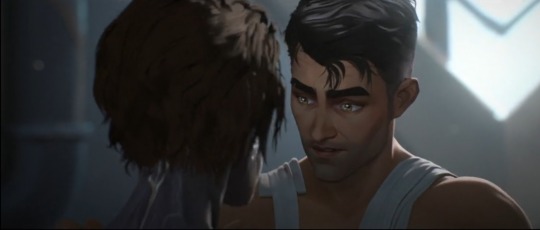
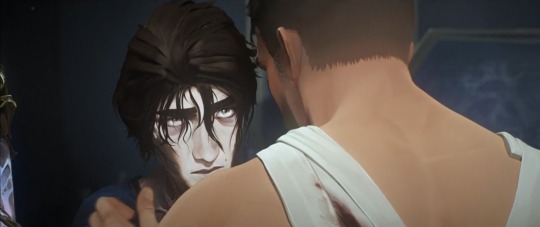
Viktor has now changed, merging with the Hexcore. He admits he doesn't feel "coldness", but rather senses an electric pulse. This could indicate he doesn't experience emotions, but this is contradicted by what happens in the later episodes, so I won't comment much on it. Regardless, Viktor doesn't feel positively about this change of events:
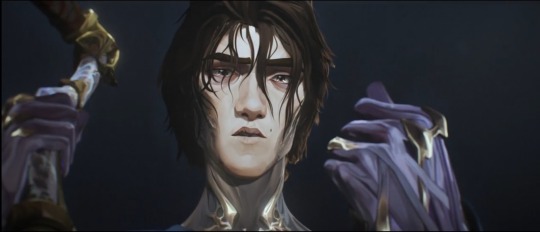
"I was supposed to die, you were supposed to destroy the hexcore"
This is the final breaking point of their relationship. The truth is coming to light, and Viktor finally confesses that the Hexcore killed Sky. We see a vision of her in Viktor's point of view. Some people point out that it’s the Hexcore manipulating Sky, I’d argue there’s still a piece of herself that remains.
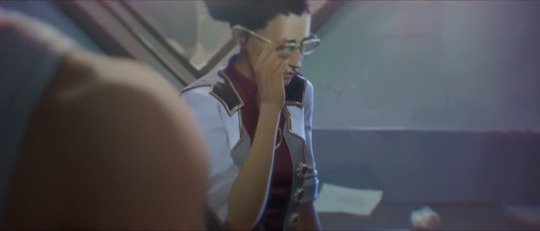
In response, Jayce tries to salvage what he can by telling Viktor he'll resign from the council. He affirms he "understands now" that his true place was always in the lab, alongside Viktor.
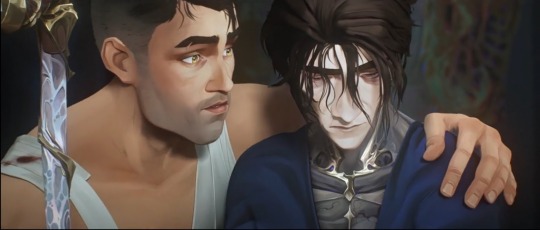
"I understand now. We'll make this right, together"
This is a pivotal part in their relationship–Jayce is acknowledging, for the first time out loud and to Viktor, how important Viktor is for him. So much so that he doesn’t need anything else, cementing Viktor’s irreplaceable role in his life. It can be seen as a declaration of love because there’s a romantic motif; the idea of finding home or belonging in another person.
The word use is also peculiar. The use of “always” makes the viewer feel as though there’s an inevitability, implying that their connection was destined to be. It also plays into a common romantic trope, where a character realizes their romantic feelings for another when faced with their absence.
Jayce’s willingness to give up his political position is a selfless act, akin to that of Viktor’s in season 1. He’s giving up everything he’s worked for and his position of power to prove to Viktor that he’s someone worth sacrificing personal ambitions for.
However, Viktor's far too gone and proclaims his final goodbye. When confronted with their partnership, we get a hint of something we have suspected was there all this time:
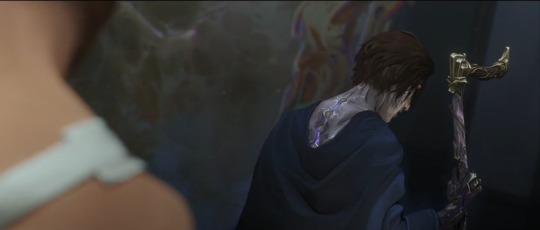
"Our paths diverged long ago"
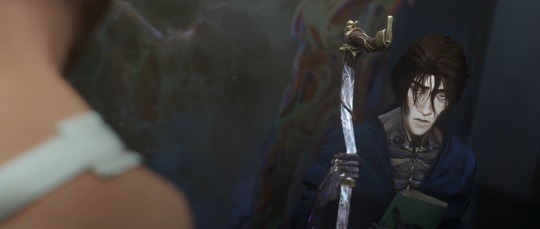
"It was affection that held us together"
This can be analyzed in a platonic light, but it can also be interpreted romantically. Jayce's finally coming to the understanding of his faults with Viktor, and he’s ready to sacrifice everything for him (in exchange for forgiveness). It could be said that his feelings for Viktor are deepening as he's faced with his departure, realizing a little bit too late what he's lost.
It's also worth mentioning that he calls Viktor his "best friend" in this instance, drawing distance from the word he used in season 1 (brother). This shift in language marks an evolution in their relationship.
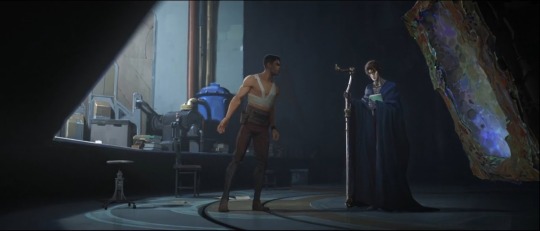
"You think it’s so easy? To turn your back while your city looks to you for salvation? To cling to principles while your best friend bleeds out in your arms?"
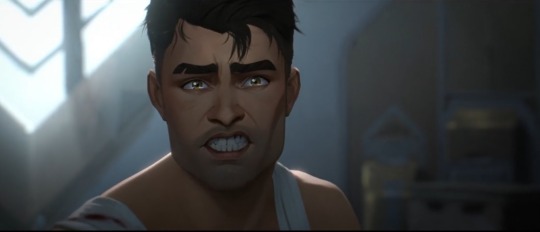
"I never asked for this"
This can be read as an apology. Jayce might be indirectly addressing his neglect towards their relationship; he’s finally expressing the pressure he has felt to take responsibility and lead the city, which has distanced him from Viktor.
In Viktor's scenes, we can hear Sky's voice guiding him. In my opinion, she symbolizes Viktor's guilt, and is used as a way for Viktor to "redeem" himself in his own eyes through the act of saving others. Sky presents herself in a different way at this point. As others mentioned, it could be because she’s a projection of Viktor's idealized memory of her, shaped by his collection of her notes and her book. This is quite a different Sky from the one that we got in season 1, much more assured and confident. Of course, this might have to do with Hexcore's influence as well. I do believe there’s still parts of her true self in there.
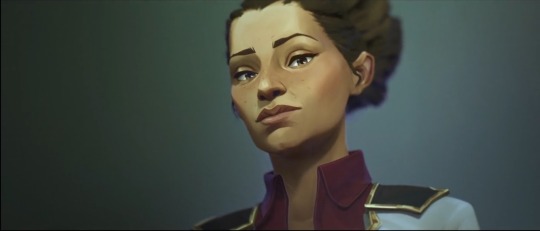
We can see he’s seeking her approval as a way to alleviate the burden of her death. It's also worth noting the religious imagery that's used with Viktor, which I feel there's no need to explain because the iconography is evident. Regardless, here are a few images for reference:
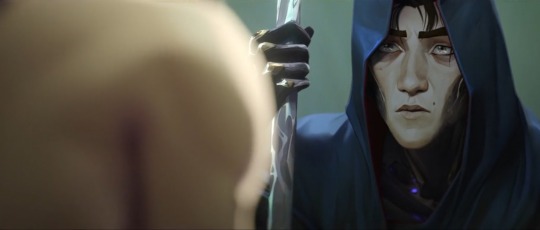
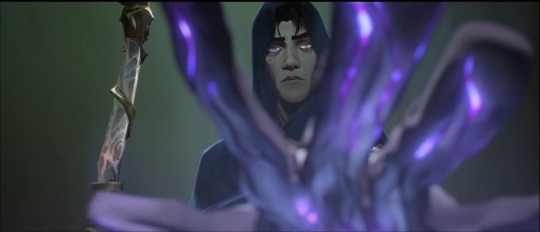
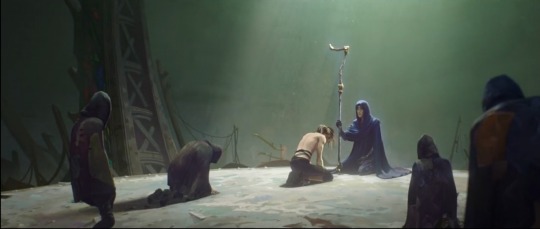
Episode 3
Ekko, Jayce and Heimerdinger are transported to different dimensions after the Hexcore is corrupted, encountering a "wild rune" (according to Ekko). There is no Viktor scene in this episode. I will not be discussing the episode as there isn't much to say in regards to Viktor and Jayce's relationship.
Episode 5
Fast forward to this episode, Jayce is teleported to the Hexcore again, where he encounters Viktor, now in the form of Salo. We can see how disheveled Jayce is, in comparison to Salo's pristine form. After a brief talk, Jayce kills Salo.
Scenes
When Jayce confronts Salo, we can see the visions he gets from being in his alternate dimension:
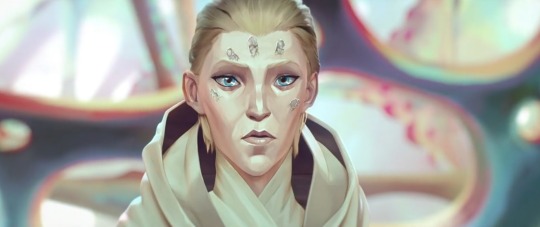
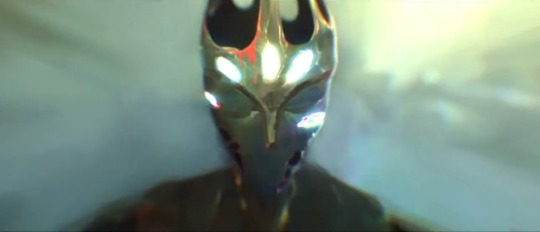
He asks him how he's able to walk, to which Salo responds with: "Who do you think could mend such a broken creature?"
There's a certain subtext within this line of dialogue. First, Viktor is positioned as a saviour in Salo's eyes. He also uses particular words: mending the broken. This is what Viktor believes he's doing: fixing the brokenness in people.
The brokenness and faults he perceives within himself is something he seeks to heal, and this drive to "mend" is extended to those he considers flawed or in need of salvation.
Then, Viktor takes control of Salo's body in order to speak with Jayce.
"I'd feared I wouldn't have the chance to speak with you again"
We can see the marks in Salo's face. Jayce's reaction to hearing Viktor's voice is somehow hopeful and defensive at the same time: though the tone of his voice sounds like disbelief, he grips his weapon tight. Jayce longs for Viktor's return but is also wary of the changes that have taken place.
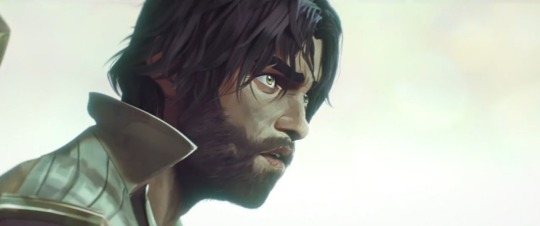
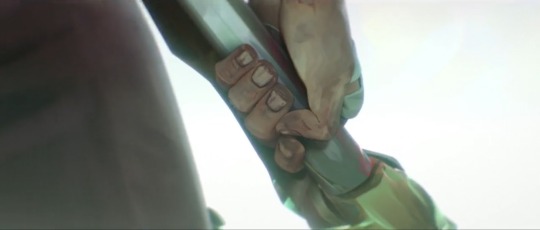
While they “catch up”, Jayce asks Viktor this:
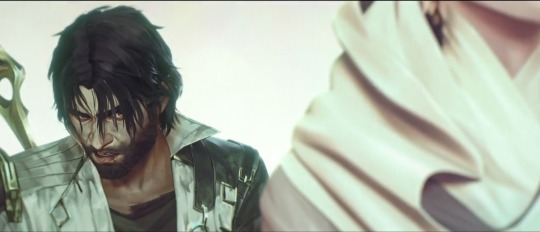
"Is salo's still in there?"
We know this is just setting up their future arc in regards to Viktor taking people's autonomy away after "curing" them. Salo himself shows a deep devotion to Viktor, declaring he "owes him everything".
We also get these lines of dialogue:
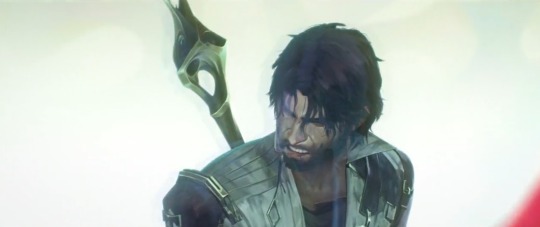
"I thought you were done with Hextech"
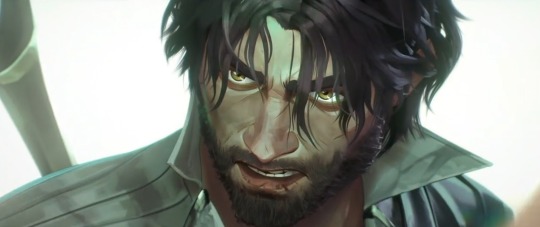
"And me"
In this instance, the word “me” is being emphasized as it’s set apart by a noticeable pause. This pause conveys Jayce's remorse towards Viktor abandoning him; he’s implying that Viktor's abandonment goes beyond their Hextech partnership (which is why they're separated grammatically). Somehow, Viktor leaving their partnership feels synonymous with Viktor leaving him. It’s not uncommon for this to be a trope in romantic rivals to lovers relationships, where one character yearns for the other. We’ve seen it before.
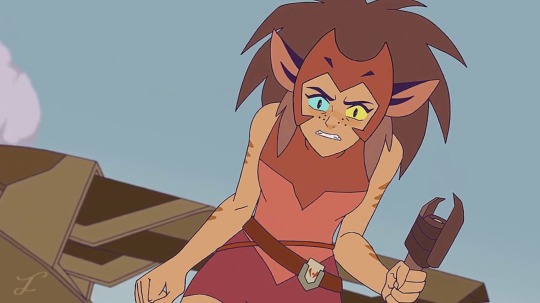
"Because you left me"
Even though in the previous episodes Viktor has said he didn't feel much but an electrical pulse, he uses a different excuse this time:
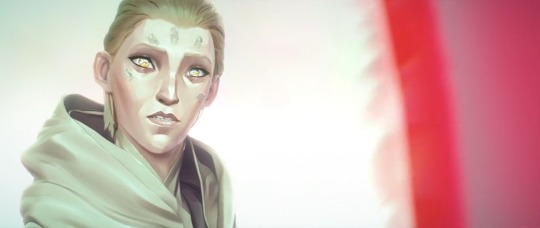
“I was clouded by emotions”
Jayce attempts to confront Viktor, trying to reach a peaceful resolution, which doesn't work:
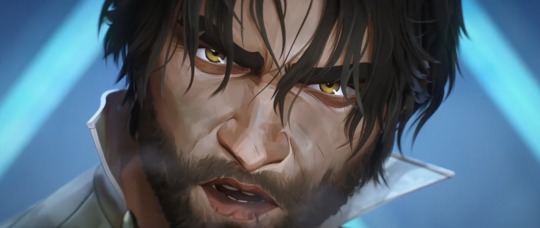
"We have to end it Viktor"
In regards to this, Viktor notes that Jayce is different, and deduces he has touched the Arcane. Jayce's response?
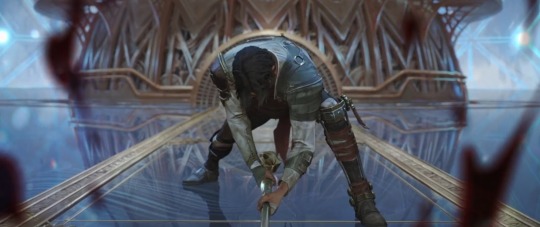
Episode 6
Summary
Viktor tries to heal Vander. After Jayce comes back from his alternate dimension, he attempts to kill Viktor.
Scenes
In one of the first scenes, we can see Viktor replaying the moment Jayce killed Salo. He appears concerned, saying:
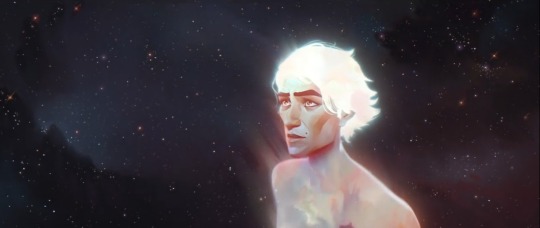
"That isn't Jayce"
He doesn't really mention anything about Salo, like Sky. This is another point where we can see he’s no longer in touch with his humanity, or his past morals.
He claims there's another will at work within Jayce, which he describes as a "singulation (...) simultaneously self-replicating and self-annihilating". He doesn't realize at this moment that he's talking about himself. Sky mentions they've never seen complexity like this, to which Viktor responds:
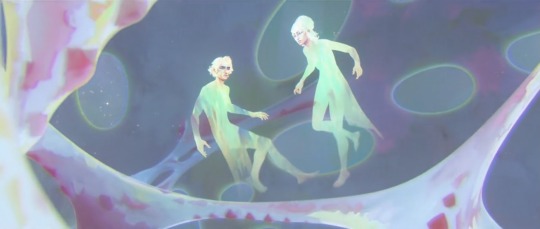
"Flawless, exquisite chaos"
Near the end, when Jayce arrives at their commune, Viktor leads him with the help of one of his followers, a child. The child's actions are marked by confusion, yet unwavering acceptance towards Jayce. These could be interpreted as the child's actions on their own accord, without Viktor's influence; regardless of the case, Viktor probably knew that Jayce was coming, as we've seen he's aware of everything his followers sense.

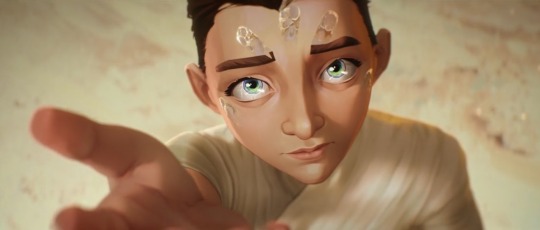
Parts | 1 | 2 | 3 | 4 | 5 | 6 | 7 | 8 |
#arcane#viktor arcane#jayce talis#jayvik#arcane analysis#arcane s2 spoilers#arcane s2#arcane theory#jayvik nation#long post
35 notes
·
View notes
Text
The Archetypes of Red Rose, White Rose
I need to balance my brain out due to sudden onset of depression. It is the result. Rommel is probably the only general who, even if you draw him from the back, he's still recognizable- flowers, a camera, and love for beauty. Rommel has a Venus-Mercury conjunct with a direct Neptune influence; he is going to appreciate artistic expressions.
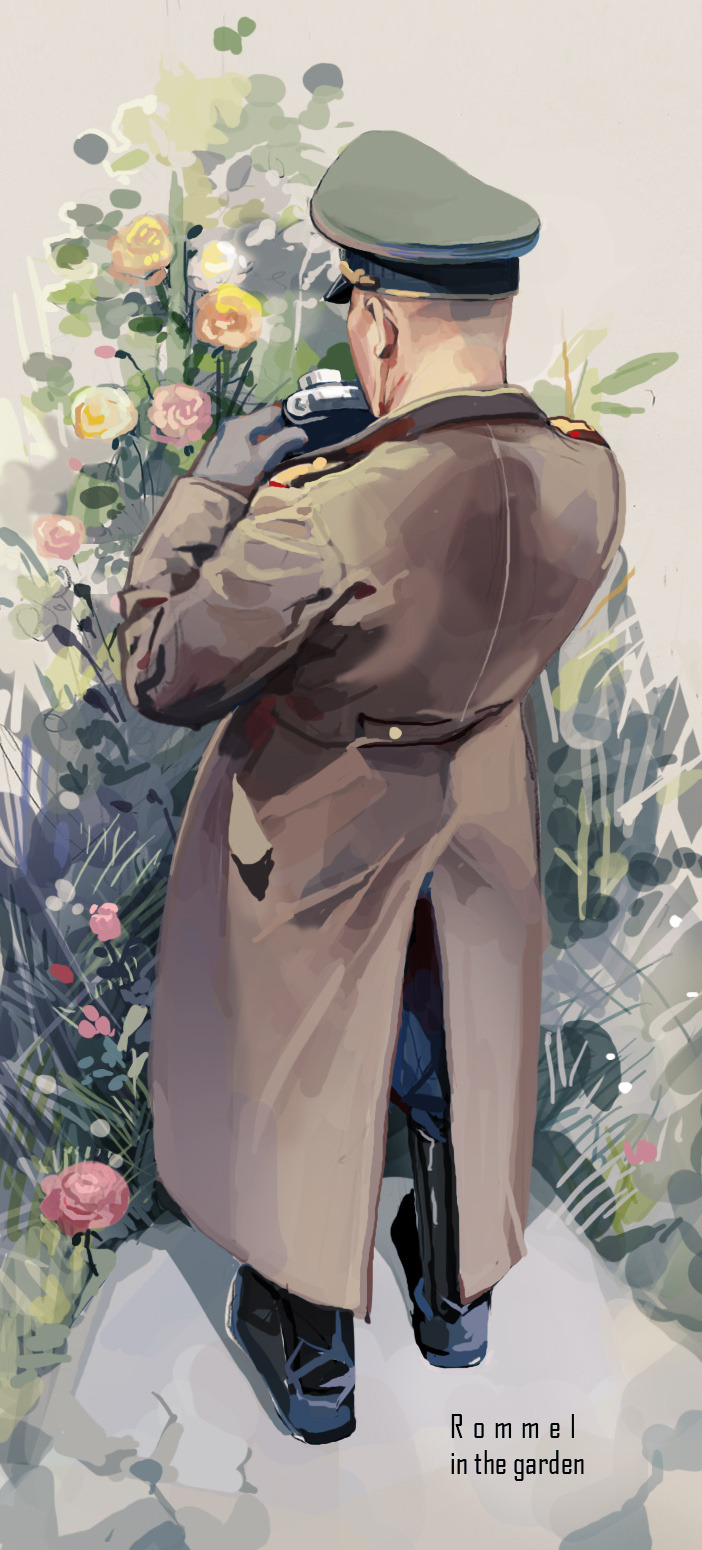

In fact, this colored-doodle with an unintentional Mucha vibe has the energy of his wife Lucy in mind. According to some sources, Rommel wrote home to Lucy daily, as it was reported to be his mental crutch- I imagine it to be transcendental emotional support, not unlike my own experience, my own relationship with our Tumblr community here. Whether you guys interact with me directly or not, you keep me alive. My sincere thanks to you.
Lucy was a formal dancer in Danzig with a decent middle-class background, her father seemed to be a land owner- Lucy being able to do art, probably added to his admiration for her- fellow artists, angelic companionship.
I suppose he did need emotional supports, and a lot of it-- Rommel is the only high commander with whom Kessering "the smiling Albert" did not get along-- which is a feat. After all, Kessering was very renowned for his exceedingly cordial and diplomatic temperament. The same could be said of von Rundstedt, the calm, gentlemanly, old Prussian field marshal. These two could put up with some bad BS from any one else, except Rommel. He was too intense, too mentally off-balance, too difficult to deal with for his colleagues.

There are a few things I noticed from Rommel's biography (including the Trail of the Fox, 2005), that allow me to make some observations. His love for Lucy appears to be non-sexual. They had their only son 12 years after marriage. That is a pretty long time, not customary with a Scorpio man who has a 8th house Mars (who is supposed to have at least above average sex drive).
As a matter of fact, Rommel had a daughter with Walburga Stemmer before his marriage with Lucy was finalized. At that point Rommel’s family felt the need to step in and strong-armed him back with his fiancée-- one reason being to prevent the young lieutenant from the pitfalls of sex and alcohol. In my humble opinion, the subtext here might be Lucy would not lead him astray in that regard, therefore his conservative family would rather have him marrying Lucy.
A side note, Stemmer family still holds a collection of hopelessly romantic letters from Rommel. Did Rommel write comparable letters to Lucy at that point in time? A bit hard to tell.

I could not recall which article comments that Rommel was "hen-pecked' in the household, but Lucy was dominant at home, that part had been very true.
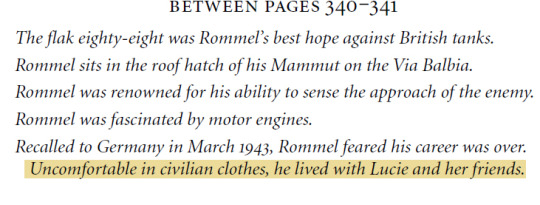
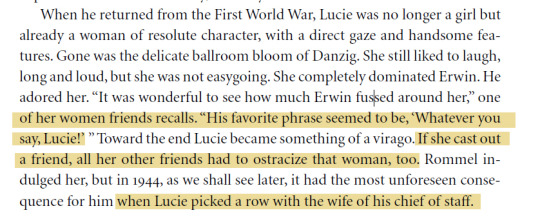
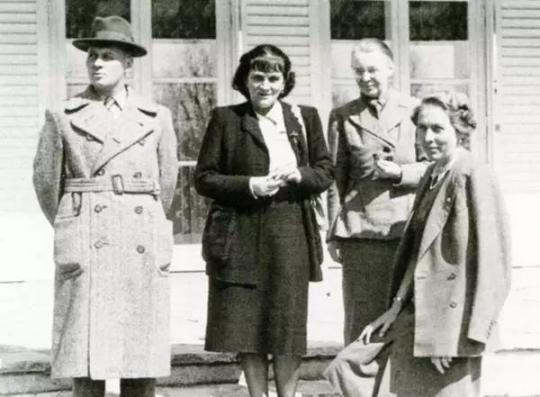
Ouch, I don't know, some aspects of this living environment must've been toxic to Rommel no matter how much some folks wants to romanticize it. It is horrible to be in a friend group where there's a mean girl boss who takes pride in ruling over her husband and turning any girl who crosses her into a persona-non-grata. But I digress. Back to my title.
Nevertheless, for me, Lucy being archetypal White Rose still holds water as a concept.
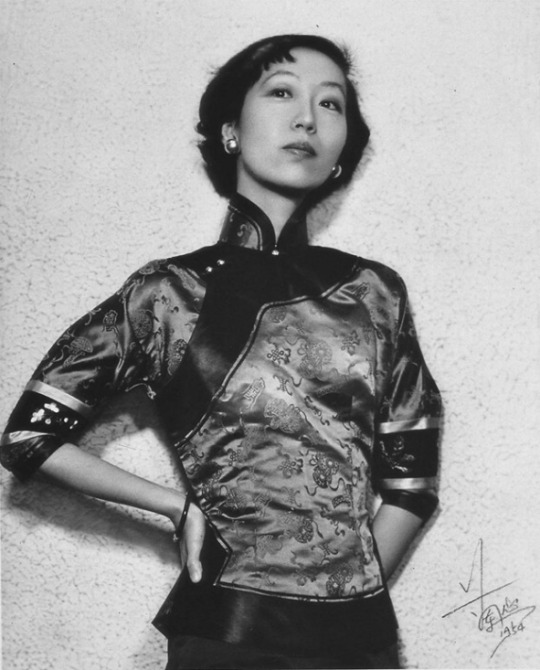
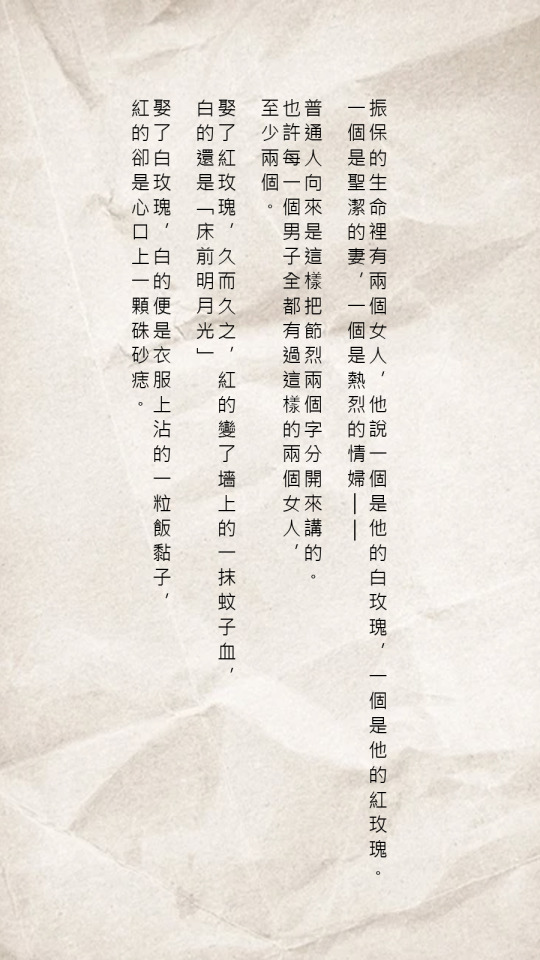
The Red Rose- White Rose archetypes originated from the same-titled short novel by Zhang Ailing, one of the 20th century's greatest female writers. She depicts love's tragedies as Chin dynasty fell apart and China marched into an era of post-colonialism, world war II, civil wars and partisan conflicts-- and eventually, modernity.
White rose is your ideal wife, the guardian of your family's social standing. She is angelic, she seems docile, she reminds you that you are from a place of honor and integrity, not of seedy backgrounds and carnal desires. White rose kills love by loving you, by being stable, by calming you down whenever you freak out. Very slowly, she castrates you, she brings you home to domesticate you.
The Red Rose symbolizes those dark desires, a black hole that sucks you in to have sex with you, a fragrant bed, a sex dungeon you do not have the will power to claw yourself out of. Red rose loves you by conquering you, destroying you and everything you represent and cherish with triumphant strides. Very quickly Red rose tears you down, burns all your bridges, until you are beyond recognition, until you are flesh, blood, fire and desire, a literal mess.

It is implied in Ailing's novel that men invariably choose the White Rose, because they are human, all too human. Marrying her, he regrets it; not marrying her, he regrets it even more. Such is love's tragedy in the face of humanity, and tragedy is the only inevitability in Ailing's universe. That's why I pull Lucy in as a faint through-line in my Montgomery x Rommel fanfics... not that I am going to write any more, I don't think so.
And yes, Red Rose is synonymous with Bernard Montgomery, in my fandom brain's humble opinion.
I know I am weird.
56 notes
·
View notes
Text
youtube
This was a fascinating video on the evolution of American acting from older, theatrical 'representational' styles to the more modern, naturalistic 'presentational' style.
A large part of it is dedicated to breaking down the history of the extremely poorly defined term 'method acting', outlining the different theories of acting of Konstantin Stanislavski with his 'System' and the interpretations put on it by his American followers such as Lee Strasberg and Stella Adler, and how they differ from the modern pop-culture conception of 'method acting'. It's fascinating stuff - I did not realise just how much Stanislavski's ideas have affected the way we think about acting, literature etc. (dude invented the word 'subtext'!).
But in Thomas Flight's view, he's bringing these up in part to deflate them - he's ultimately arguing that, instead of a specific new method of acting being introduced, it's more that the goals of acting changed as the style of film in general changed. There are many routes to a naturalistic performance, but you have to want to do that in the first place, and older films wanted a more theatrical style.
Besides just being an interesting thing to learn about lol, the big question when I look at the theory of acting is how do you apply it to animation, since that's my field lol. 'Acting' is a big part of animation, but it differs in one big way, which is that it's much slower and more deliberate. I don't want to claim that there's no intuitive aspect to it, if anything you gotta learn all the technical stuff (timing, spacing, weight, overlapping action etc.) so well that you don't have to be constantly thinking consciously about technical stuff and can focus on letting the performance flow and feel natural... but still, a lot of the ideas expressed about imagining inhabiting the scene, getting into character etc. happen at a remove from putting lines down on the paper/screen. In animation just getting to the point of 'moving like a person', the absolute baseline of real life acting, is an effort in itself!
Still, knowing about the different styles and theories of acting is helpful. What is it about a character's expression that tells us that there is something that they're not saying, and tells us to infer some particular emotional context behind their words? A lot of it has to do with 'voice acting' stuff - cadence, intonation, hesitation. Then there's the way they move, stuff like how much space they take up, how energetic they are, how much their centre of gravity moves around. The gaze, where they're looking and how their eyes move around, is a huge part of it.
A film actor probably is doing a lot of this intuitively. I'm sure there is some conscious thought about it but the link between brain and muscles is so strong that you can be moving your eyes before you've had time to fully think through 'I should look over there to communicate what's on my mind'. With an animated character, every motion requires you to think about start and end poses, what the arcs are, follow-through, how many drawings to give it, etc. etc. You're simulating the 'physics' of the animated world and trying to convey the emotion of the character all at once. But you can still absolutely have an expressive, naturalistic performance in animation - and all these extra things you control (abstraction, simplification, etc.) give you more expressive tools as well which aren't available in live action.
I'm not nearly at the technical level of drawing and animation where I can really apply all these ideas yet, but it's good to know what's on the distant mountain...
46 notes
·
View notes